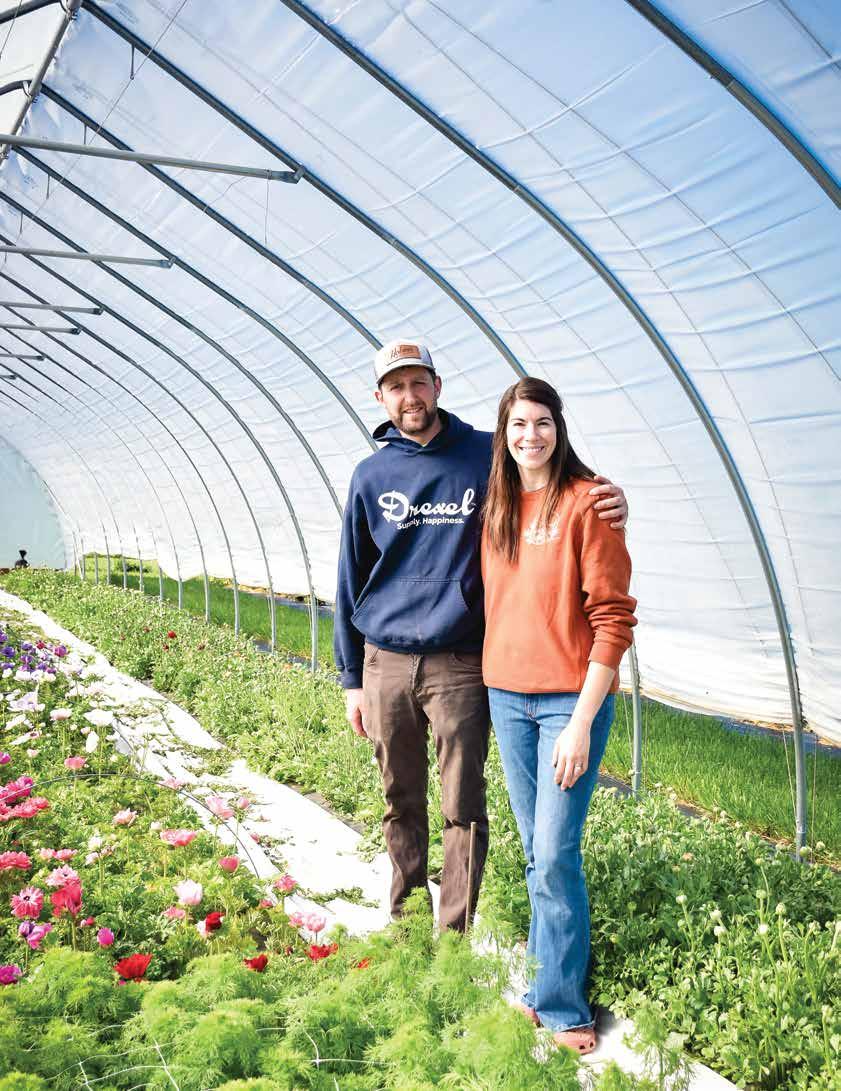
page 8 Agriculture and at Airy Point Farms Community Blossom WISCONSIN FARM BUREAU FEDERATION®'S JUNE | JULY 2024 • VOL. 30 NO. 3 | WFBF.COM RuralRoute
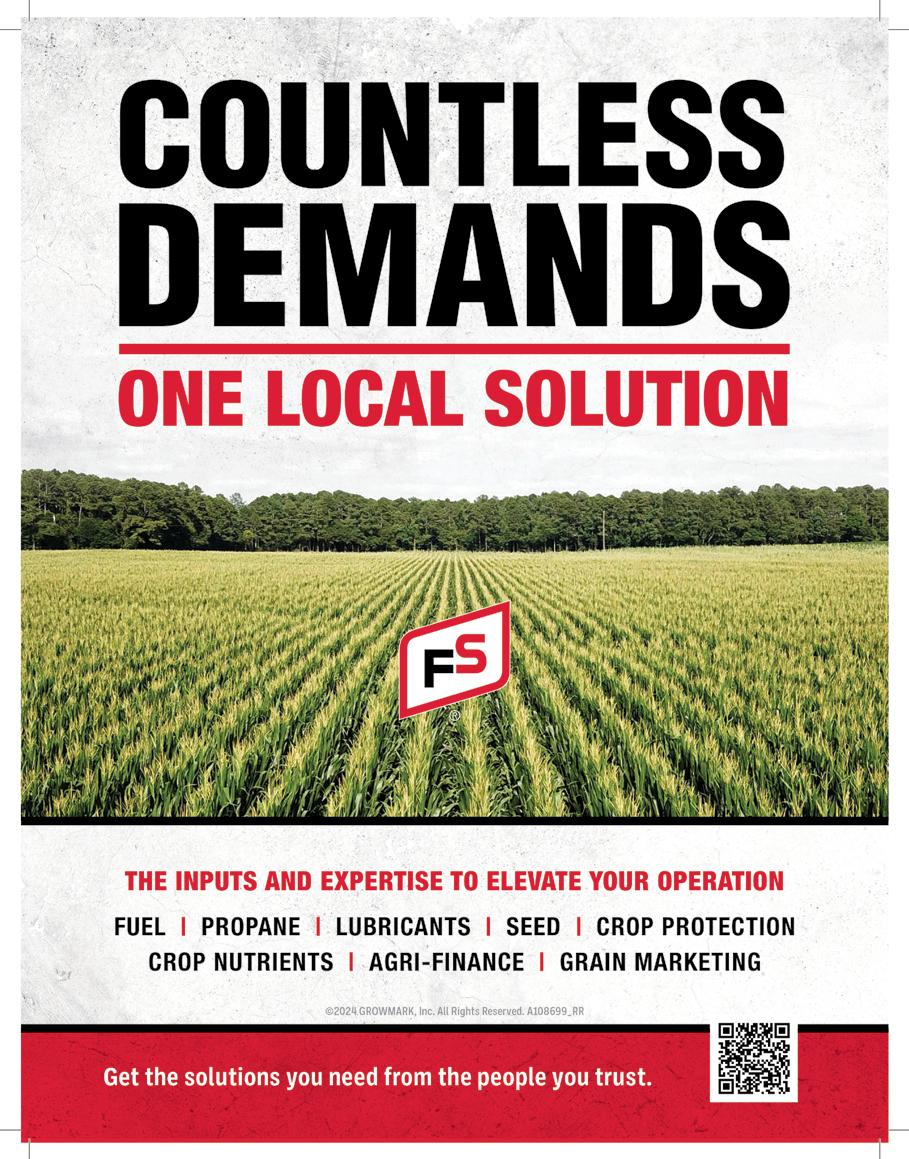
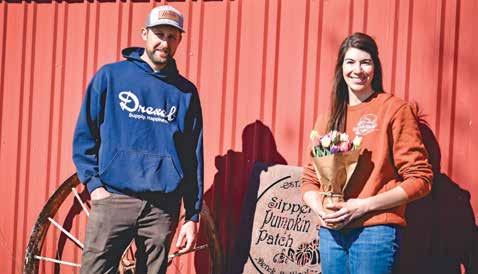
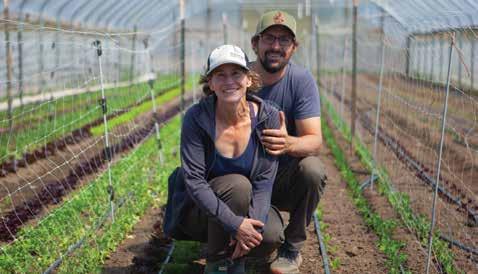
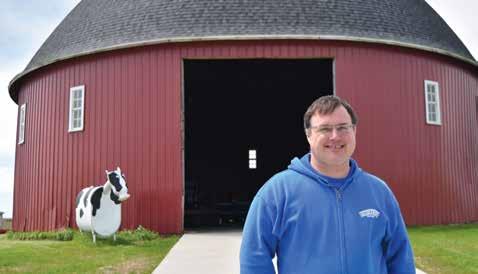


NEW MEMBER PORTAL
Everything you need to know about the new membership portal.
AIRY POINT FARMS
Fond du Lac County members grow flowers and a community.
RED DOOR FAMILY FARM
Marathon County farm builds fellowship from farm to table.
VESPERMAN FARMS
Agritourism allows families to make memories with this Lancaster family.
EXTENSION CONNECTION
University of Wisconsin-Madison Extension is your connection.
GATHER AROUND THE TABLE
Enjoy these recipes from the Wisconsin Beef Council.
MEMBER BENEFITS
Learn about a new benefit to help members stay healthy.
VOICES
Columns from Olson, Duvall and LaCount.
MENTAL HEALTH
Learn about #FarmNeighborsCare and Heroes of Hope.
AG IN THE CLASSROOM
Agricultural Literacy Grant winners announced.
RURAL MUTUAL
Improvements to increase your homes value and protect your devices while you're away.



3 wfbf.com JUNE | JULY 2024 contents vol. 30 no. 3
7 8 19 32 24 16 12 10 30 39 43 COVER PHOTO BY LYNN SIEKMANN stay connected WIFarmBureau ONLINE LIBRARY Read our previous issues at wfbf.com/read. 8 12 10
EDITOR’S NOTE
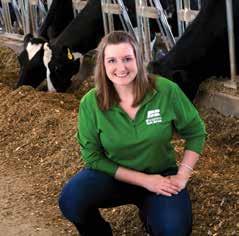
After the last big rainstorm, we had some massive puddles in our yard. I didn’t think anything of it until we unleashed our two toddlers outside. Instantly they were amazed at the overnight swimming pool that had found its way into our backyard. After many minutes of trying to convince them otherwise, they sat in the water and were happy as clams to be soaking wet and full of mud.
Man, were they messy. But, as dirty as they were, they were happy and embracing the mess and enjoying the moment.
As I reflected for a minute, I thought to myself, “The last time I stepped in a mud puddle and got my socks wet I was cranky the rest of the day. These two really know how to embrace living life to its fullest.”
What would it look like if we all embraced the messes of life? Jumped in the puddles and even enjoyed it.
In May, Farm Bureau and other organizations spent time sharing resources
for Mental Health Awareness Month. It’s true that life is messy and sometimes really hard. Things like stress, societal pressures and life’s curveballs hit us all and impact our mental health.
For farmers, there are even more layers. As a farmer, your business partner is Mother Nature. Additionally, there are costs you can't control. In some cases there is pressure to keep a farm that been in the family for generations afloat. Whether you are a farmer or not, we all can do a better job of talking about our mental health.
In our efforts through the #FarmNeighborsCare initiative, the hope is that neighbors check on neighbors and spend time talking with peers about challenges they are facing. You will see some of these efforts on page 30. We also announced the winners of the 2024 Heroes of Hope campaign.
You’ll notice a theme with our three feature stories. These three farms bring people together in different ways. As gathering spots in their communities, these members provide great perspectives on bringing people together. Enjoy these stories starting on page 8.
As summer kicks off, lives will no doubt get busier and messier. Let’s all make a promise to do our best to live in the moment and embrace the messes as they come.
As always, thanks for reading.
Amy Eckelberg Rural Route Editor Wisconsin
Farm Bureau Federation
Editor Amy Eckelberg - 608.828.5706
Address of Publication
Wisconsin Farm Bureau Federation PO Box 5550
1241 John Q. Hammons Dr. Madison, WI 53705-0550
Postmaster: Send address changes to Wisconsin Farm Bureau Federation PO Box 5550 Madison, WI 53705-0550
Contact Information
608.836.5575
800.261.FARM (3276) wfbf.com info@wfbf.com
WFBF Board of Directors
Brad Olson, Frederic (President)
Joe Bragger, Independence (Vice President) Dave Daniels, Union Grove
Arch Morton Jr., Janesville
Robert Nigh, Viroqua
Kevin Krentz, Berlin
Dan Meyer, Kiel
Brian Preder, Weyauwega Kim Bremmer, Loyal
Brenda Dowiasch, Augusta (Promotion and Education Committee Chair) Kat Peper, Rock Springs (YFA Committee Chair)
Wisconsin Farm Bureau Federation’s Rural Route (ISSN 1082-1368) (USPS 39940), the official publication of the Wisconsin Farm Bureau Federation, is published six times per year in February|March, April|May, June|July, August|September, October|November and December|January. Subscription of $5 is included in Farm Bureau dues. Periodical postage is paid at Madison, Wisconsin. All rights reserved. No portion of this magazine may be reproduced in whole or part without written consent.
For advertising rates and information: Wisconsin accounts contact Slack Attack at 608.222.7630 or barbara@slackattack.com. National accounts contact Casey McNeal at 800.798.2691 ext. 334 or casey@iafalls.com. For general inquiries, contact Amy Eckelberg at 608.828.5706 or aeckelberg@wfbf.com.

4 WISCONSIN FARM BUREAU FEDERATION Rural Route
WISCONSIN FARM BUREAU FEDERATION’S Route
Rural
Designer Lynn Siekmann - 608.828.5707 Contributors Cassie Sonnentag - 608.828.5711 Rachel LaCount - 608.828.5709 Kylie Ver Kuilen - 608.828.5721
Hello from Wisconsin Farm Bureau!
WFBF June 9 Inbox
to Wisconsin Farm Bureau Members
Maybe it’s hello for the first time or maybe you’ve been a member of Farm Bureau for decades. However long, we are glad you’re here. Allow us to reintroduce ourselves.
Wisconsin Farm Bureau Federation is the state’s largest general farm organization with more than 48,000 members. We represent farms of different sizes, commodities and management styles. The organization is made up of voting members and associate members.
As a member you belong to one of 61 county Farm Bureaus, run by a board of directors made up of people working in agriculture. Farm Bureau prides itself on being a grassroots organization and each year, county voting members set the policy that guides WFBF on local, state and national affairs.
Farm Bureau members serve on boards and committees working on legislation, regulations and issues that impact agriculture and rural areas. These hard-working members are supported by a staff of professionals working to assist them in their activities.
While WFBF works on behalf of members locally, with regulatory agencies, and in our state and nation capitols, we are a private, dues-paying membership organization.
From that explanation you might think that WFBF is just for farmers, but it’s truly a place for anyone who eats and wants to support Wisconsin’s agricultural community.
We have many money-saving member benefits that all members can enjoy – whether you farm or not. In addition to access to Rural Mutual Insurance Company policies, members can save money on everything from hotel rooms to prescription drugs and office supplies.
Plus, many of the issues of concern to the Farm Bureau don't just affect farmers: they also impact consumers, taxpayers and property owners.
As we look to serve you, our members, we are excited to have unveiled a new member database in June. This project has taken years to get to this point, but with more data and a new system we are going to be able to serve you better. You now have access to a member login, an easy renew option and soon will have access to a member benefits app. By making sure your information is current, it helps us provide you timely and customized communications. You will find the ability to login to your membership portal by clicking the login button at the very top of wfbf.com.
We know there will be some learning curves with the new system, so we ask for your patience as we learn along with you. We assure you this change is for the betterment of our service and the longevity of our organization.
As always, thank you for being a member and being part of the Farm Bureau family.
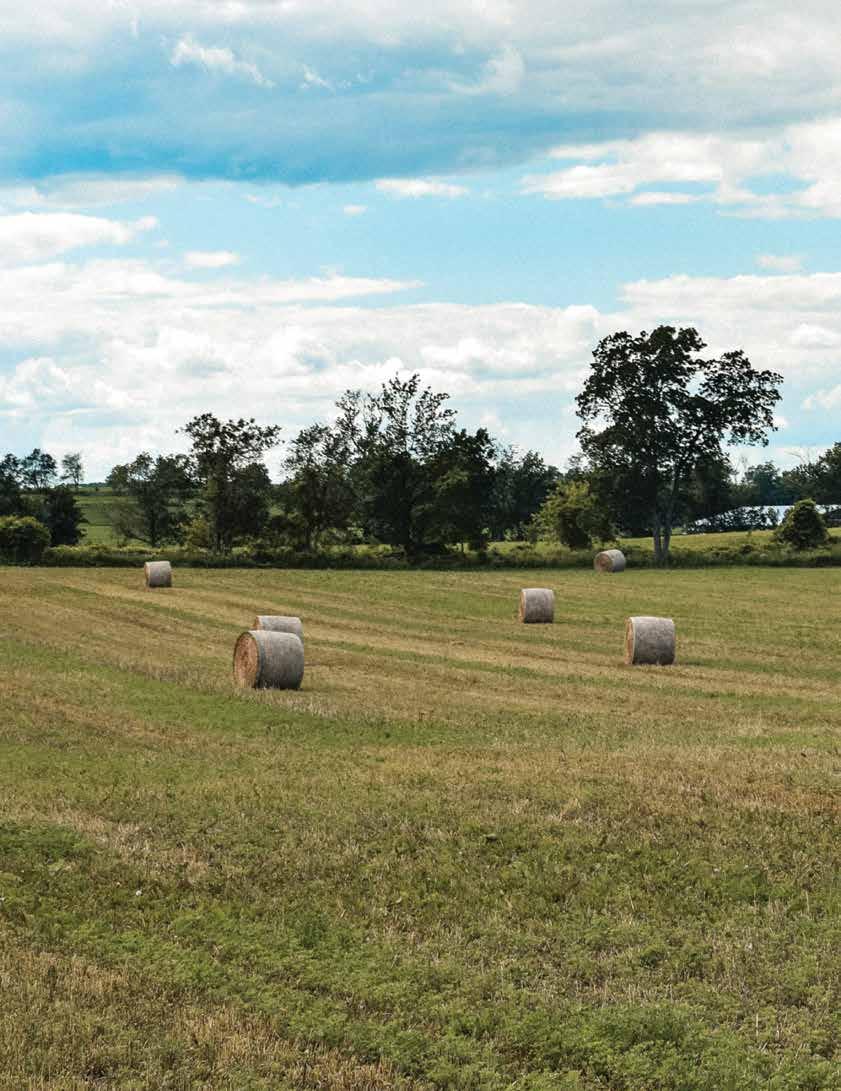

Why pay dues to be a Farm Bureau member?
I’m not a farmer, so why should I be a member of Farm Bureau?
Can my spouse and I share a membership?
I have an insurance policy with Rural Mutual. Why is Farm Bureau membership required?
How much are my annual membership dues?
Farm Bureau is a membership organization that relies on dues as a primary source of revenue. By joining Farm Bureau, you become part of an organization that provides numerous member benefits (for more details, see page 25) while helping to support Wisconsin’s #1 industry. Members are classified at the county level as voting or associate, with voting members having the right to hold office and vote on the organization’s policy.
Agriculture is a major driver of Wisconsin’s economy. We all have a vested interest in helping maintain a safe, affordable and abundant food supply. As a member of Farm Bureau, you support programs and policies that ensure that farmers can continue to feed and clothe us, while keeping Wisconsin’s economy strong.
Yes! A Farm Bureau membership is a family membership. It applies to the member, member’s spouse and any children younger than 21. A family member 21 or older requires his or her own membership.
In 1934, Wisconsin Farm Bureau members created the Rural Mutual Insurance Company to service the insurance needs of its members. Rural Mutual is an affiliate of Farm Bureau and access to insurance products sold through Rural Mutual is a benefit of membership. Therefore, a paid Farm Bureau membership is a prerequisite to purchase auto, homeowners, country estate, farm and crop/hail policies through Rural Mutual Insurance Company.
Membership dues are established at the local level by your county Farm Bureau board of directors and vary from county to county. Annual dues range from $50 to $70, depending on which county you live in.
When you join Farm Bureau, you not only become a member of your county Farm Bureau, but also Wisconsin Farm Bureau and American Farm Bureau. Your membership dues are allocated as follows: How are my dues used?
Wisconsin Farm Bureau Federation
Used to support state activities, conduct programs and provide staffing for those efforts throughout the state. Consumer and youth education, issue advocacy, leadership development and member publications are services that also are funded with state dues.
American Farm Bureau Federation
Forwarded to support Farm Bureau activities at a national level. These funds support agriculture’s voice in our nation’s capital as well as the many programs that AFBF has in place to educate consumers, share the message of agriculture and provide online resources to its members.
Member Protector Policy
Members receive $2,000 in accidental death insurance for themselves and their spouse and $1,000 for unmarried children under 24 years of age residing in the same household; policy does not increase in value.
County Farm Bureau
The remaining portion of your dues depending on the county is used to fund local events and activities. This may include county meetings, scholarships and other programs for youth, consumer education activities and member service programs in that county.
$50 $5 <$1 $
6 WISCONSIN FARM BUREAU FEDERATION Rural Route
You've got questions. We've got answers.
Login Process for Member Information and Benefits New
Member Portal
We are excited to share that we now have a member interactive database. This means that with your help, we can provide better service to you, our members.
At the top of wfbf.com, you’ll see three buttons: Login, Join, Renew. To create your account and access your member information, you will want to click the login button.
Once you’ve clicked Login, follow these easy steps to creating your official account.
1) Under the login button, click “Create account”.
2) Click yes to “Are you a Farm Bureau Member”.
3) Verify your membership by entering your membership number, zip code and last name. (If you don’t know your membership number, you can find it on your mailing label listed as your Member ID or by emailing info@wfbf.com.)
4) Select your name and click next.
5) Create a User name (use your email address).
6) Create a password and confirm it.
7) Click Register.

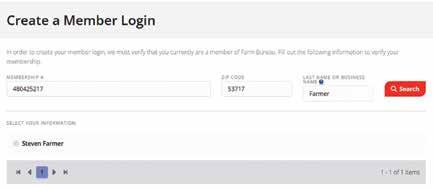
Once you are logged in you will have access to update your account information, add additional information, verify communication preferences, access your membership card and sign up for automatic renewal. Throughout the coming months staff will assist you as needed through this transition to a new system. Please be patient and if you have questions, reach out to a staff member or contact info@wfbf.com.
Member Benefits
Member benefits are now located within a private member portal and soon through a mobile app. This helps protect the integrity of our benefits so we can be sure only Farm Bureau members are accessing these exclusive offers.
To login to the system on a computer or phone browser, visit wfbf.com/membership/member-benefits.
A few things to note:
• You will see a prompt to login to access member benefit details.
• First time users seeking to access the member benefits portal will need to create an account. Follow the instructions listed above to create an account. You will need your membership number to do this.
• Returning users should login with their username (email) and password to view members-only content.
If you need more assistance accessing your member benefits, call 1.800.261.FARM (3276).

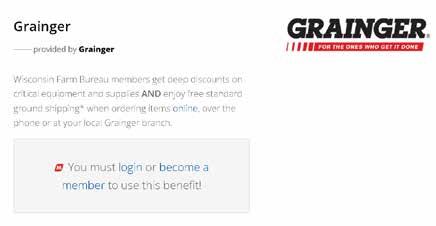
7 wfbf.com JUNE | JULY 2024
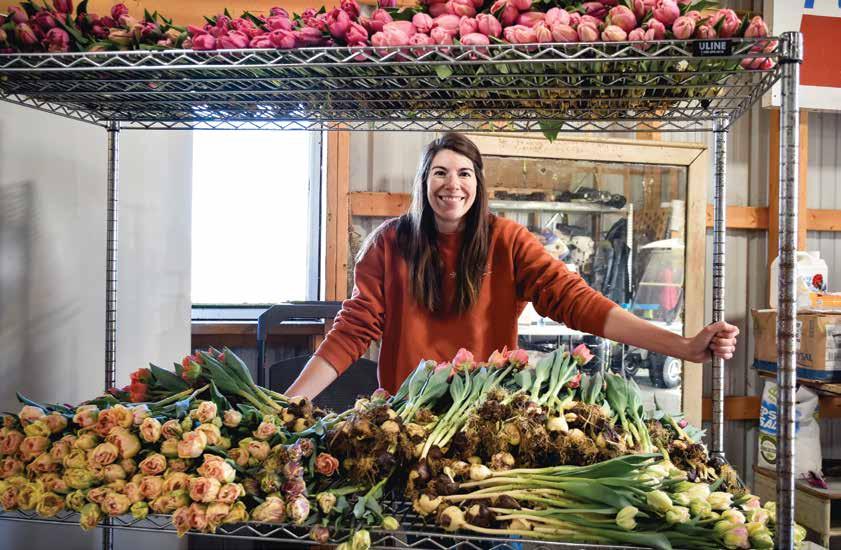
Agriculture and at Airy Point Farms Community Blossom
By Lynn Siekmann
Nestled near one of the highest points in Fond du Lac County, Airy Point Farms cultivates community. Since starting their farm business, Nicole and Derek Sippel have focused on connecting people through their diverse offerings but especially their flowers.
The Birth of a Dream
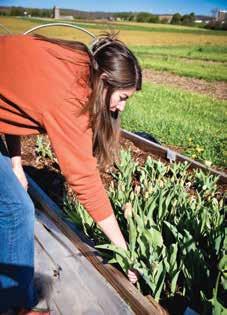
Growing up on a farm, Derek always knew that agriculture was his calling, even if he wasn't sure exactly how that would look. Nicole, on the other hand, didn't come from a farming background. Her passion for animals led her to go to school to become a veterinarian, where her and Derek's circles overlapped on UW-Madison's campus. After college, the couple moved to St. Cloud to farm with Derek’s parents, Earl and Yvonne. They now have two children, Mae (6) and Lucan (1).
In 2020, Nicole was looking to move to part time work at the vet clinic she worked at to spend more time with their young family. Nicole
recalled making an off-hand comment one day about growing flowers and soon Derek was quickly writing a business plan, saying if you give him a reason to grow more things he will find a way. The couple started growing flowers and haven’t looked back.
Derek and Nicole complement each other well in this endeavor through his passion for growing things and her knack for artistic flower arrangements and marketing. Today, Nicole works full-time on the farm during the summer when the farm is busiest and part time at the vet clinic in the winter when things slow down on the farm.
A Farm for All Seasons

Airy Point Farms embraces diversity, offering everything from vibrant flowers and engaging workshops to a variety of farmfresh products. When asked about their favorite aspects of the farm, Nicole and Derek's enthusiasm was evident. Nicole loves "you-pick" events and teaching flower arranging, while Derek enjoys growing pumpkins and engaging directly with visitors.
The farm grows its community connections through a social media presence, subscription newsletter and word-of-mouth.
8 WISCONSIN FARM BUREAU FEDERATION Rural Route
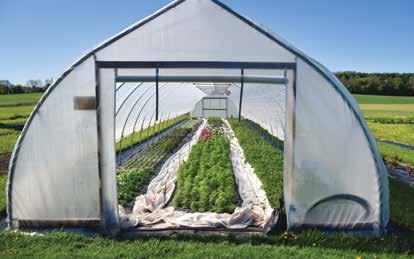
Their journey into hosting events began in 2021 with a selfserve pumpkin stand, expanding in 2023 to include flower attractions like Dahlia Days and a sunflower field, enhancing the farm's role in the community.
There also is a self-serve farm stand at Airy Point Farms which offers a variety of products that change with the seasons. From mixed bouquets and farm-fresh eggs to garlic scapes and pumpkins, there's always something fresh available. During the fall, when the farm stand is staffed, it features goods from other local businesses, such as baked goods, soaps, candles, apples, cider and Christmas trees. This seasonal collaboration enriches the farm's offerings and strengthens ties with other local producers.
Cultivating Memories and Community
One of the most fulfilling aspects of their work for Nicole and Derek is being part of their customers' special moments. Whether it's a Mother’s Day bouquet, a wedding arrangement or the perfect pumpkin for Halloween, the products from Airy Point Farms are a part of many family celebrations. Unlike their earlier experience in dairy farming, which offered less direct consumer interaction, growing flowers and produce allows them to see the joy their work brings to others.
They also sell beef raised and processed within a mile of their farm. The positive feedback from customers who appreciate the quality and local sourcing of their meat is gratifying for the couple.

Connect with Airy Point Farms
airypointfarms.com instagram.com/airypointfarms facebook.com/airypointfarms
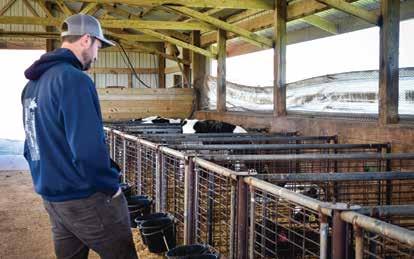
Looking ahead, Nicole and Derek hope their farm continues to be a place where people can connect with their food and their farmers. Nicole values having the community know their farmer and having people question what they think farming is because it might not look how they would expect.
A Farm Full of Promise
Reflecting on their journey, both Nicole and Derek are proud of the path they've taken. Derek always knew he would farm, but the direction his career took was unexpected. His advice to his younger self is simple: "Do what makes you happy and see where it leads you, you might be surprised."
Nicole’s message to her younger self echoes a similar sentiment of adaptability and growth: "It’s okay to shift, it’s okay to flex. See where life takes you and grow with it."
Farming is often a solitary pursuit, but for Nicole and Derek, being part of Farm Bureau provides a sense of community. Knowing there is an organization advocating for farmers' interests and offering a platform to share both struggles and successes has been important.
Airy Point Farm, with its vibrant flowers, diverse events and close-knit family business, is a wonderful part of their community. It is a place where community and agriculture intertwine, and where the future is as bright and promising as the blooms in its fields. Nicole and Derek's story is a reminder that with dedication and creativity, the seeds of an idea can grow into something wonderful.
Giant Pumpkin

9 wfbf.com JUNE | JULY 2024
Each year Derek grows a giant pumpkin. This seed was planted on April 7. Soil heating cables are used along with the hoop house until the threat of frost has passed. Derek has grown a pumpkin that is one of the top ten largest in Wisconsin.
Derek looked over some of the farm's calves. The couple raises Angus-cross beef cattle.
Red Door Family Farm
Builds Fellowshipfrom Farm to Table
By Cassie Sonnentag
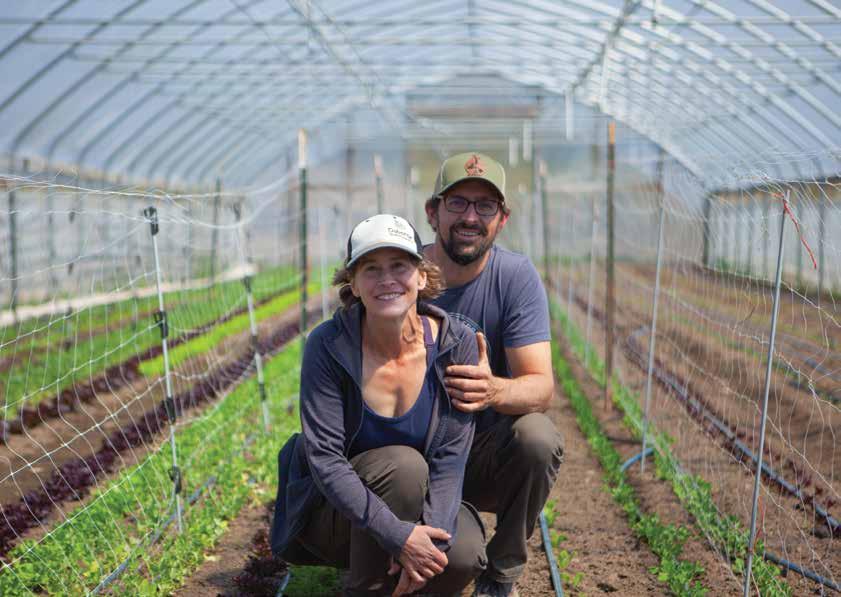
Ared door is recognized as a welcoming symbol to wayward travelers. As first-generation farmers Stacey and Tenzin Botsford planted their farm roots in Marathon County in 2015, they knew they wanted their farm to symbolize the same.
Red Door Family Farm is a certified organic farm located near Athens. The Botsfords grow 10 acres of diversified fruits and vegetables that are sold through their Community Supported Agriculture (CSA), local farmers markets, restaurants and an online store. Additionally, the family has partnered with the Marathon County Hunger Coalition to design the Farm to Family Produce Program, which brings CSA-style produce shares to area food pantries.
These initiatives contribute to the Botsfords’ mission of creating an equitable food system that supports rural communities, promotes health and is both economically and environmentally sustainable.
The Calling
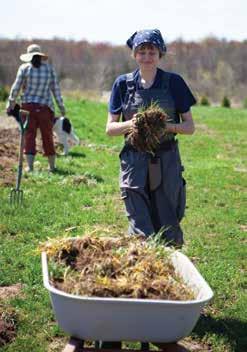
While both Stacey and Tenzin grew up in Wausau, life ultimately took them out West. Through a variety of experiences, they observed that the happiest of people lived close to the land and had connection to a community.
“Stacey was working in Idaho and I was working in Oregon,” Tenzin explained. “When we decided we wanted to get serious about farming and building a family, we made a bet on a football game. Oregon won – so that’s where we went.”
The couple took part in apprenticeship opportunities working on organic vegetable and livestock farms in Oregon. The opportunity to learn from others is what Tenzin credits for setting them up for success as beginning farmers.
“We knew we wanted to do something meaningful and feel connected to something,” Tenzin said. “Eventually, we wanted to set down our own roots and see all four seasons from one vantage point.”
The Start
The Botsfords took the opportunity to return to where they
10 WISCONSIN FARM BUREAU FEDERATION Rural Route
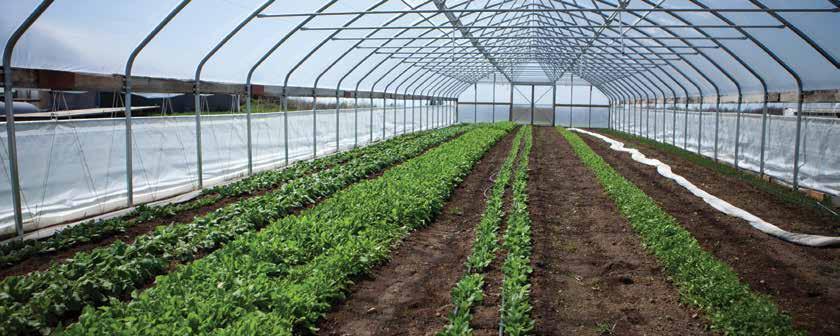
“The farm does not stand alone; without community, it doesn’t stand at all."
were raised in Central Wisconsin in 2014. Tenzin recognized that getting started as a first-generation farmer was not going to be an easy task.
“We needed to find a viable entry point into agriculture,” Tenzin said. “We, ourselves, really like to eat good food; direct sales seemed like the most logical option.”
In its first year, the Botsfords started their CSA and selling at local farmers markets, both of which continue to be staples for their business.
A CSA is a small-scale farming model that builds direct connections between consumers and the farmer. This model allows the Botsfords to sell “shares” of their harvest in advance of the growing season. Members of the CSA receive a weekly bundle of produce at peak freshness. In addition to their produce, the Botsfords provide a weekly email with their customers that explains what is in the share that week, tips for storing each item as well as recipes to incorporate them.
“We are able to offer a very curated experience,” Tenzin said. “Members can come out any time they want to see the farm – which is something that is important to us.”
The Community
cohosted by Red Door Family Farm and Cattail Organics.
“It is a great way to raise money and support community,” Tenzin said. “One hundred percent of ticket sales go toward the purchase of fresh produce for Farm to Family.”
A sense of community is a major piece of the philosophy at Red Door Family Farm.
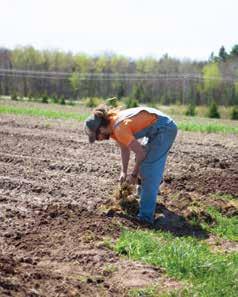
“The farm does not stand alone; without community, it doesn’t stand at all,” Tenzin said. “As farmers, we want to add value to the whole community, not simply be located here.”
The Legacy
According to Tenzin, the Botsfords have a broad view of sustainability.
“To us, sustainability means being sustainable in all facets: environmental, economical, lifestyle and employees,” Tenzin said. “Across the board, we want everything to be the best quality it can be.”
From the residue management to cover crops, the farm incorporates several practices to better the soil health. Tenzin works with a neighboring dairy farm to compost bedding and incorporate into the soil. These practices ultimately impact produce quality.
In addition to their traditional sales, Red Door Family Farm also prioritizes connecting community food pantries with fresh produce. Since 2020, the Botsfords have collaborated with Cattail Organics and the Marathon Hunger Coalition to bring CSA-style shares to food pantries throughout Marathon County.
“The program is called Farm to Family,” Tenzin explained. “The goal of the program is to get healthy options to those in need; the biggest thing missing in food pantries is fresh produce.”
In 2024, the program plans to serve 4,800 families with fresh produce over the course of 22 weeks. Funding for the program happens through private donations, grants and a variety of events. One of those events is the Farm to Feast Dinner
“We want to do the best for us and for our customers, and quality soil truly takes our produce to the next level,” Tenzin said.
Beyond environmental stewardship, fostering a positive employee environment has also been paramount to the Botsfords’ success.
“We put a lot of energy into our employees; it has been six years since we have replaced a position,” Tenzin explained. “That comes from having clear goals in mind that give employees a sense of appreciation and purpose.”
A symbol of welcoming, the red door embodies the Botsfords’ philosophy. From farm to table, they continue to build fellowship with their community through quality produce, stewardship and care.
To learn more about Red Door Family Farm or purchase their produce, visit reddoorfamilyfarm.com.
11 wfbf.com JUNE | JULY 2024
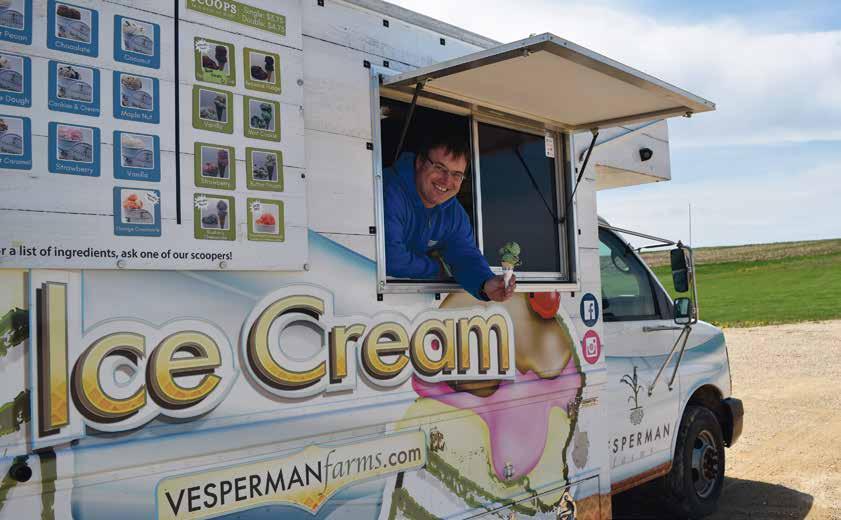
Agritourism Allows All Families to
Make Memories on Vesperman Farms
By Kylie Ver Kuilen
Where can you have breakfast with the Easter Bunny, watch a trebuchet launch a pumpkin hundreds of feet in the air, pet barnyard animals, ride down a zipline, get lost in a corn maze AND enjoy freshly made ice cream? Vesperman Farms, of course!
Located in Lancaster, Vesperman Farms specializes in fun for ages 5 to 85. Though the farm has been a place for family fun for more than two decades, it wasn’t always an agritourist destination.
The History
The farm, now known as a community gathering space, was purchased in 1900 by Louis Vesperman and has been passed down five generations to its current owner, Kyle Vesperman. The farm was used for traditional crop farming until the mid-1980s when Kyle’s parents, Bruce and Judy, began to diversify by raising pumpkins and vegetables to sell at their local farmer’s market. Not only was this a way to bring in additional income, but it was something the whole family could take part in.
front yard became an impromptu pumpkin patch and business began to take off, Kyle saw firsthand the potential success agritourism could have.
Kyle then went on to UW-Platteville where he started to see agritourism experiences of all kinds find success. Thinking back to his first business venture, Kyle began to wonder, “Instead of picking the pumpkins and bringing them into town, why don’t I bring the people out to the farm?”
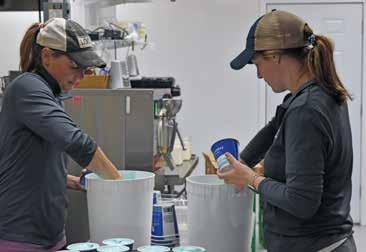
As Kyle grew older, he followed in his parents' footsteps and took a special interest in growing and selling pumpkins. One day, his grandma, who lived on Main Street in Lancaster, had the idea to sell the pumpkins in her front yard. As his grandma’s
Thus began the adventure of turning a century-old, traditional farm into an agritourist destination.
The Community
From the very beginning, Kyle’s focus was framed around the families in his local community.
“When we’re brainstorming ideas for the farm, our main focus is families with young kids. We want this to be a place where people can bring their families and make memories,” Kyle said. “Now, we’ve been at this long enough that there’s a whole generation of kids who grew up around here and this is a part of their memories.”
Though much of the experience is catered to children with games and activities such as life-size Connect 4, playing in
12 WISCONSIN FARM BUREAU FEDERATION Rural Route
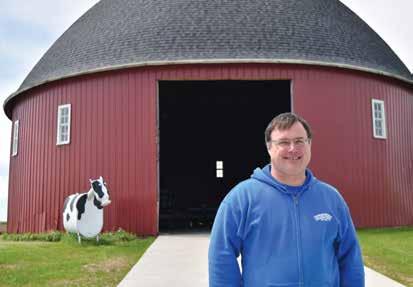
the corn bin or taking a ride on the kiddie train, Vesperman Farms has become a place for community members of all ages to gather.
“We’ve had people go on their first dates here, people who get engaged here. After a few years of doing enough weddings, I’ll run into couples on busy days who got married here and now have one, two, three kids. This place is special to them because mom and dad got married here,” Kyle said.
During peak fall season at Vesperman Farms, you can find couples on pumpkin patch dates, friends perusing local goodies at the shop and families enjoying their annual visit to the farm, making it truly a community space for all.
“We mean a lot to a lot of people now. I was just a kid when I started all of this, trying to keep the family farm and land going. I wasn’t even thinking about all that stuff, but I discovered along the way that there are so many people who have a connection or story or memories of this place. It’s very special,” said Kyle.
Kyle also values giving back to his community with fundraising opportunities. A few years back, Kyle approached the Lancaster School District with the idea since Vesperman Farms kettle corn and apple cider donuts are so wildly popular. The idea ended up working out for both.
“It started with one school and now it’s 20 to 30 different schools, organizations, clubs, PTOs, daycares. You name it,” Kyle said. “In the last five to six years, we’ve helped raise well over a quarter of a million dollars with these fundraisers.”
Vesperman Farms’ success has been driven by hard work and
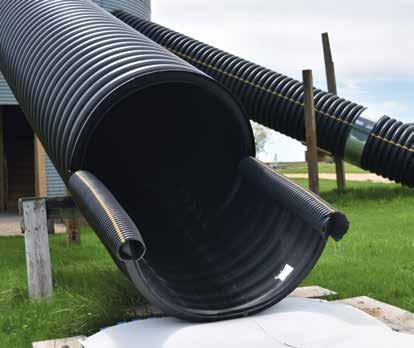
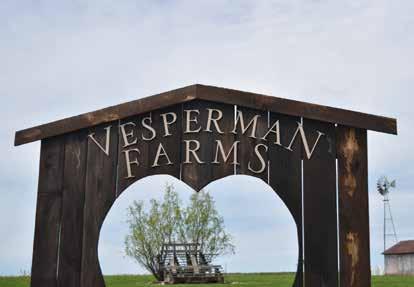
dedication to the community. Kyle credits much of this achievement to his three full-time staff members and seasonal employees.
The Future
Always looking to provide fun experiences for all, Vesperman Farms is adding some new ones this summer. After seeing much success with their ice cream trucks, Vesperman Farms turned a portion of their event barn into an ice cream shoppe starting in June.
“We will be open on the weekends, from the afternoons to the evenings. We’ll be adding sundaes and baked goods, made from scratch cookies and pies so visitors can enjoy cookie sundaes and warm pies with a scoop of ice cream,” Kyle said.
Vesperman Farms will also be hosting a Sweet Corn Festival in July which will feature food and drinks, music and farm activities as well as a Flower Festival in August which will showcase vibrant blooms, date night packages and provide an opportunity to create even more joyful memories.
Reflecting on the past and looking forward to the future, the impact the farm has had on many is a major motivator for Kyle to continue making Vesperman Farms a space for everyone in the community.
“This farm now means a whole lot more to people than just me and my family.”
To learn more about the farm visit vespermanfarms.com or find them on social media.
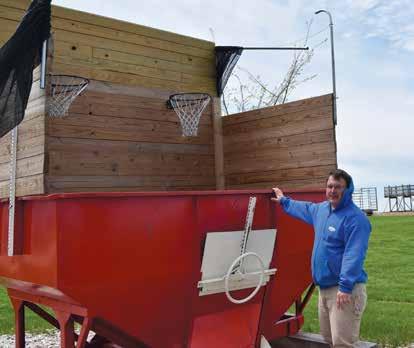

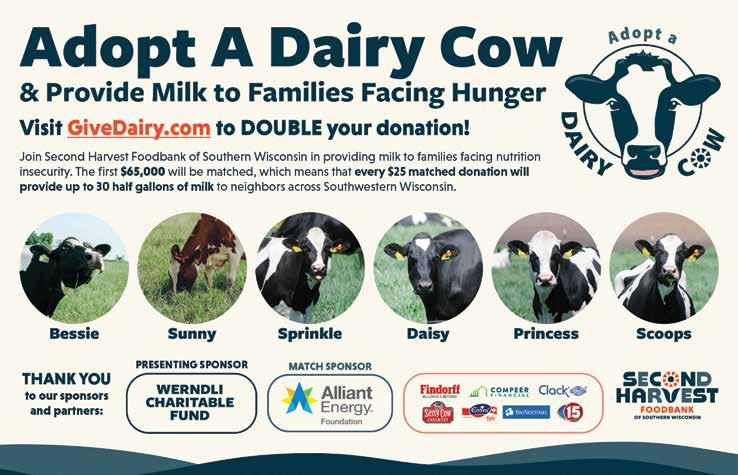
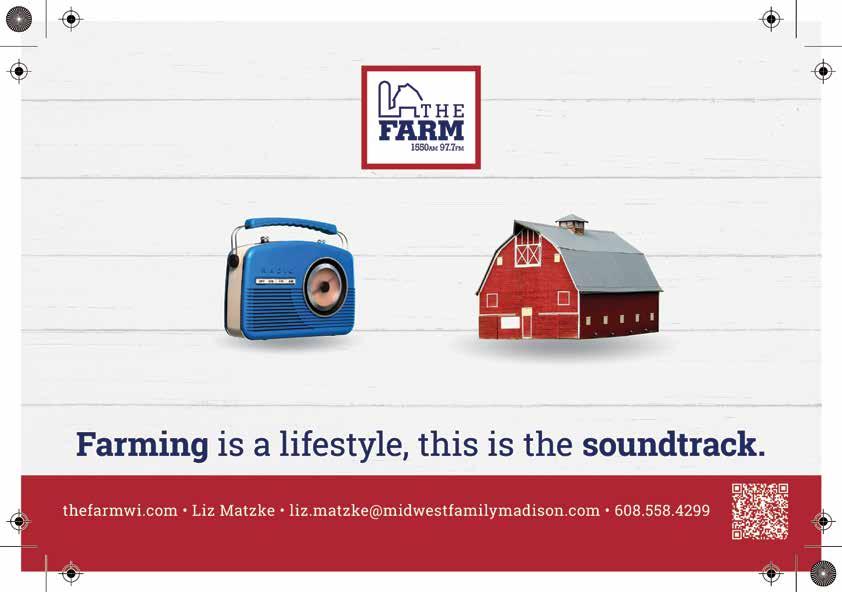
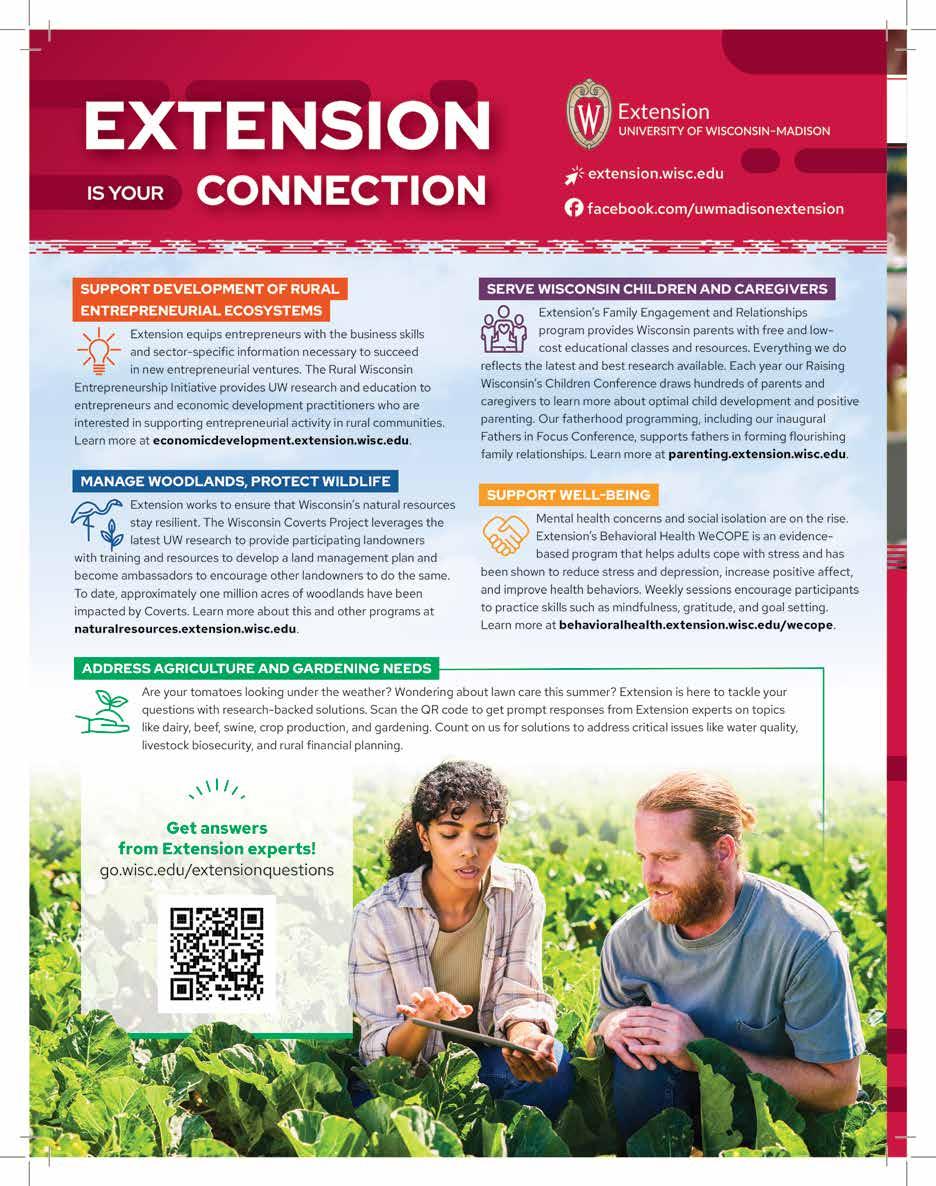
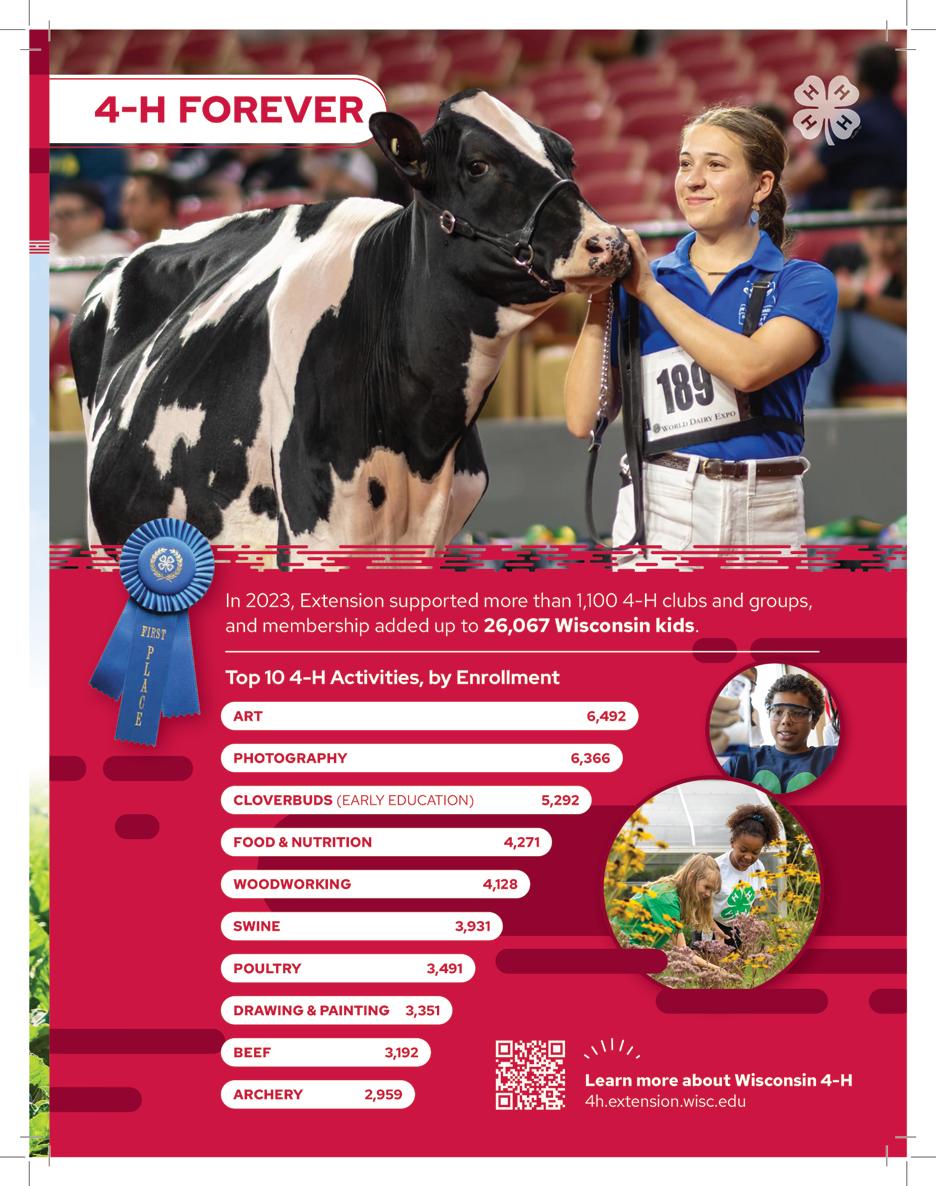 With Kari Schoenike
With Kari Schoenike
A Family A-Fair: More Than Just Blue Ribbons
With summer upon us, many 4-H, FFA and other youth organization members across Wisconsin are preparing for state, district and county fairs. Whether that prep includes walking pigs that just won't lose their attitudes or pulling all-nighters working on creative stitchery, there's something magical about the fair preparation process that resonates with exhibitors long after the fair is over and ribbons sit collecting dust.
As a life-long 4-Her and the daughter of our local fairboard president and 4-H agent, a love for fair season runs in my blood. In addition to the usual fair prep (i.e. watching Gilmore Girls and stitching until 4:00 a.m.), I spent my ‘fair’ share of time at the Dodge County Fairgrounds, helping get things ready for what I felt was the event of the season. This included everything from doing rounds with my dad to check on electric and plumbing to being "voluntold" by my mom that I was helping set-up display areas and sweeping out the Youth Building. Sounds glamorous, right? But honestly, it kind of was. There was something so exciting about being part of the secret pre-event happenings. It felt like planning a party for 50,000 of your closest friends.
In Dodge County, our fair isn’t until mid-to-late August. The absolute perfect culmination of summer, showing off the projects I had worked hard on, connecting with old friends, making new ones and, of course, enjoying grilled cheese and chocolate malts from the Farm Bureau foodstand. While there were certain project areas I was aggressively competitive in, there were a few areas I was less than gifted in. Regardless, the process of selecting, creating and entering things I made is a level of excitement that is difficult to articulate. Going from seeing a picture in a pattern book to watching it come to life in front of me is a wonderous process I still enjoy to this day.
board entirely fell apart because I used the wrong glue, the time I totally blanked on which hook I used to crochet a dish cloth and told the judge I used a 10 (crocheting hooks are gauged in letters, not numbers) and countless other flops in between. It wasn't about the blue ribbon though, it was about the experience along the way.
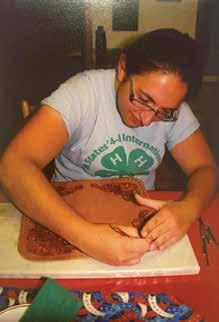
Whether it was blue ribbons and praise or lower ribbons and constructive feedback, exhibiting at the fair provided me with countless learning opportunities. Beyond that, preparing the grounds, working with volunteers and helping with the less than desirable clean-up fostered a sense of belonging and family that expands well beyond my biological clan. What I didn't realize at the time is that through all this volunteering and fair prep and exhibiting, my parents were helping me develop problem solving, critical thinking and communication skills. Your project's not turning out how you thought? What else can we do? You aren't sure how to carve that shape yourself? No worries! We can work on it together and it's okay to ask for help. You don't want to sweep the Youth Building? Sometimes you have to do things you don't like, but a bunch of us will work together on it and make it more fun. Parents are really tricky like that ... teaching you lessons when you aren't expecting them.
Fair season is so much more than blue ribbons. It's togetherness, volunteerism, supporting one another, learning by doing and trying new things. Fair season is truly a family a-fair.
I would love to tell you my creations all panned out perfectly (but newsflash ... they didn't). There was the time my jeopardy
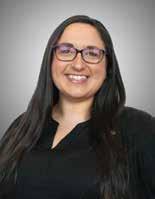
If you are preparing for your fair, I wish you luck and good experiences this year. If you’ve never been to a fair, consider visiting to see what it’s all about yourself. Local fairs can be found at wifairs.com.
Kari Schoenike is the District 2 Representative on the WFBF Promotion and Education Committee. Kari grew up on her family’s crop farm in rural Dodge County. She is the Agriculture Education Manager at Wisconsin State Fair working to promote agriculture-focused educational opportunities for exhibitors and fairgoers.
The Promotion and Education Committee is a dynamic group of Farm Bureau leaders who develop, implement and promote programs that build agricultural awareness and provide leadership development to the agricultural community.
Promotion and Education Program
18 WISCONSIN FARM BUREAU FEDERATION
Recipes courtesy of Wisconsin Beef Council. Visit gatherwisconsin.com for more recipes.
Easy Beef Breakfast Rolls
INGREDIENTS
• 1 lb. ground beef (93% lean or leaner)
• 2 tsp. chopped fresh sage or 1/2 tsp. rubbed sage
• 1 tsp. garlic powder
• 1 tsp. onion powder
• 1/2 tsp. salt
• 1/4 - 1/2 tsp. crushed red pepper
INSTRUCTIONS
Prepare Basic Country Beef Breakfast Sausage
Combine ground beef (93% or leaner), chopped fresh sage or rubbed sage, garlic powder, onion powder, salt and crushed red pepper in large bowl, mixing lightly but thoroughly. Heat a large nonstick skillet over medium heat until hot. Add sausage mixture; cook 8 to 10 minutes, breaking into 1/2-inch crumbles, stirring occasionally. Remove from skillet.
Prepare Breakfast Rolls
1. Preheat oven to 350°F. Lightly spray 12 muffin cups with nonstick cooking spray. Combine sausage, scrambled eggs, cheese
Marinade AROUND THE TABLE
• 2 large eggs, scrambled
• 1/2 c. cheddar cheese, shredded
• 1 Tbsp. water
• Fillings (optional): chopped onions, salsa, chopped cooked vegetables
• 12 balls of frozen bread dough, thawed
and water. Stir in optional filling ingredients, if desired. Roll out one dough ball at a time on unfloured surface to 4- to 5-inch diameter circle. Place approximately 1/4 c. of sausage filling into the center of the circle. Gather edges of dough and pinch together. With hands, roll dough back into ball. Place seam-side down into a muffin cup.
2. Bake 24 to 27 minutes or until rolls are golden brown.
Cook’s Tip: Cooking times are for fresh or thoroughly thawed ground beef. Ground beef should be cooked to an internal temperature of 160°F. Color is not a reliable indicator of ground beef doneness.
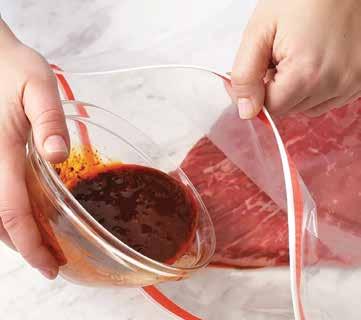

Chili-Cilantro
INGREDIENTS
• 2/3 c. prepared Italian dressing
• 2 Tbsp. fresh cilantro, coarsely chopped
INSTRUCTIONS
• 1 Tbsp. chili powder
1. Combine all ingredients in small bowl. Place beef steak(s) and marinade in food-safe plastic bag; turn steak(s) to coat. Close bag securely and marinate in refrigerator 15 minutes to 2 hours for tender steaks; 6 hours or as long as overnight for less tender steaks, turning occasionally.
2. Remove steak(s) from bag; discard marinade. Place steak(s) on grid over medium, ash-covered coals or over medium heat on preheated gas grill. Grill according to the chart for medium rare (145°F) to medium (160°F) doneness, turning occasionally.
19 wfbf.com JUNE | JULY 2024




20 WISCONSIN FARM BUREAU FEDERATION Rural Route

WITH WINNEBAGO COUNTY'S
5MINUTES
LINDA MULLINS
Tell us a little about yourself.
I grew up on a dairy farm and come from a long line of farmers. I was active in my county 4-H for 10 years. My mom and stepdad continue the tradition of farming. They stopped dairy farming in December of 2018. Now they have beef cattle and cash crops, so I still get to visit the farm now and then.
My dad started a small drain tile business with his parents and siblings. After high school, I attended college where I studied business and journalism. Once I graduated college, I started working for my dad's family business, Wisconsin Tubing. My dad and his siblings decided to sell the business to a new owner in 2019. I built a relationship with the new owner that led to my current role of Executive Assistant. Now, I consult for several businesses my boss owns. I manage everything from payroll, to HR, to marketing, event planning and sales. I wear many hats to help my boss run his businesses.
My husband and I married in 2020. We enjoy playing beach volleyball, watching movies, watching live musicals and traveling.
What do you enjoy most about your career?
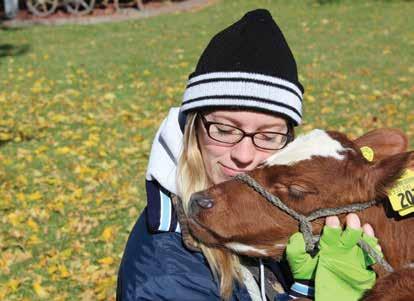
I wish everyone could share that experience or at least understand it. This is why I continue to advocate for agriculture.
What is a Farm Bureau experience that you are most proud of and why?
I am most proud of my experience on the Dairy Promotion Committee. My family is deeply rooted in dairy farming, and I am proud that I can advocate for and promote dairy products and the industry through my work on the committee year after year.
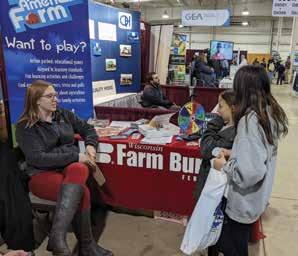
I enjoy that even though I have an indirect role in agriculture, I am still able to stay connected through all the businesses I work with. One business manufactures and sells drain tile; another builds water control structures for wetlands and marshes. The most recent business I've started working with provides transportation services for a host of dairy products throughout the Midwest and beyond. These different businesses are connected to agriculture differently and I get to advocate for agriculture in many ways through these businesses.
What is one agriculture experience that has defined you and why?
Growing up on a dairy farm with my mom and stepdad really solidified my passion and appreciation for agriculture. It is a beautiful experience that uniquely connects a person to nature.
What is something that most Farm Bureau members would not know about you? Explain.
I practice yoga. Yoga grounds me and keeps me connected with the spiritual world and nature. It is also a great stress reliever, anxiety reducer and way to stay fit.
Why are you proud to be a Farm Bureau member?
I am proud to be a voice for farmers and promote the importance of agriculture in everyone's lives.
What advice do you have for new Farm Bureau members or those looking to get more involved?
Pick something you enjoy. I guarantee you will be able to contribute to Farm Bureau and agriculture using a skill you enjoy.
Is there anything else you would like to add?
You don't have to be a farmer or tied directly to agriculture to be an advocate. My background gave me knowledge and a passion for agriculture and its importance to our society as a whole. Now I get to use different platforms to share that knowledge and teach others why agriculture is important to them.
22 WISCONSIN FARM BUREAU FEDERATION Rural Route

23
WFBF Introduces Fitness Program Member Benefit
Wisconsin Farm Bureau is excited to announce an agreement with the Active&Fit Direct™ program to offer an exclusive member benefit.
“Wisconsin Farm Bureau is committed to embracing sustainable solutions – and that starts with the health and wellness of our members,” said WFBF President Brad Olson. “We are excited to add the Active&Fit Direct program to an already compelling list of money-saving member benefits.”
For just $28/mo. (plus applicable enrollment fees and taxes), WFBF members can find their perfect gym from 12,500+ options nationwide, including 24 Hour Fitness®, EōS Fitness®, Crunch Fitness®, Blink Fitness®, Anytime Fitness®, Chuze Fitness® and more. Members also receive access to one-on-one well-being coaching on fitness, nutrition, stress, sleep and more included in their membership.
The Active&Fit Direct program is a flexible, comprehensive low-cost fitness program offered through American Specialty Health Fitness, Inc. It’s one of America’s fastest growing fitness programs. Its parent company, American Specialty Health Incorporated, was started in 1987 and provides a broad range of fitness and health care programs nationally. The Active&Fit
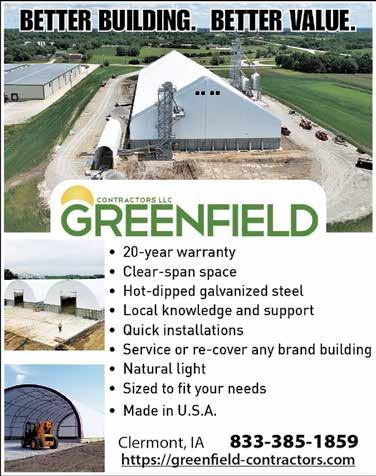
Direct program’s mission is to help you become more active without breaking the bank.
For more information about this benefit or to learn more about other discounts and incentives, visit https://wi.fbiris.com/ Benefits/all.



24 WISCONSIN FARM BUREAU FEDERATION Rural Route
BENEFITS
MEMBER















Insurance Company Rural Mutual
Get the MEMBER BENEFITS MOST out of EVERY DOLLAR with your FARM BUREAU
Farm Bureau members qualify for a variety of membership benefits and discounts that serve the needs of farmers, families and businesses in Wisconsin. Member Protector Policy
*WFBF member benefits may be changed or discontinued at any time without notice.* Learn more about your Farm Bureau member benefit savings by scanning the QR code or visiting wfbf.com/membership/member-benefits.
Wisconsin
A Reminder to Travel Safe This Summer A Message from WFBF's Brad Olson

It's what I like to call ‘go-time’ on the farm. Farm equipment of all kinds are hitting the roads for their various jobs which means you could find yourself behind a tractor or implement quite regularly.
I can tell you that traveling with agricultural equipment is a dreaded part of farming for me and probably for most farmers. It’s important that farmers ensure their vehicles meet legal requirements and operate safely while sharing roadways with their fellow motorists. But it’s equally important for those who cross paths with farmers to practice patience when encountering a slower pace due to farm equipment.
No matter what side of the equation you are on, at the end of the day, we all want to make it home safe to our families.
Here are five tips that you might consider as you hit the roadway this summer.
1. Make Smart Decisions – Follow
safe, smart driving practices at all times. Before attempting to pass in a no-passing zone, know that is illegal to pass an IOH (Implement of Husbandry) including farm tractors and farm machinery or an agricultural commercial motor vehicle (Ag CMV) in these zones.
Motorists should wait to pass a slowmoving vehicle until they have safely entered a passing zone. Farmers should not pull over in a no-passing zone to let vehicles pass unless the road shoulder condition and width can allow for the farm machinery to completely move onto the shoulder.
Farmers also should not wave a driver forward to pass. While these actions seem courteous, it sends mixed signals and is not encouraged. In a passing zone, or if the shoulder width permits, farmers are obligated to yield the roadway to an overtaking vehicle so they do not impede the normal movement of traffic.
2. Be Alert – Stay alert while driving, as you never know when you’ll meet farm equipment on the road.
The Wisconsin Department of Transportation recommends that motorists should slow down immediately whenever they see a slow-moving vehicle emblem (orange and red triangle) on the rear of a tractor or other piece of equipment. This emblem indicates that the farm machine usually travels slower than 25 mph. Stay alert, focused and patient when passing a slow-moving agricultural vehicle in an area where passing is legal.
3. Watch Out – Watch out for unexpected turns into field driveway, as it is more likely for farm equipment to turn there than at an intersection. It can
turn into a dangerous situation when a farmer is attempting to make a left-hand turn. Farm equipment, especially the tractor, will have two flashing amber or yellow lights on the cab or tire fenders of the tractor when on the roadway. When a farmer signals to turn, the light will continue to flash in the direction the farmer is turning. The other light will go solid.
Farmers are asked to comply with the proper lighting and marking requirements to draw attention to the size, shape and speed of agricultural vehicles and to alert motorists that caution is required. There are specific requirements for different types of equipment.
4. Leave Space – When a motorist legally passes large farm equipment within a short distance of a controlled intersection (stop sign or stop lights), this action can dramatically impact the reaction time and braking distance for the farmer. Farm equipment is heavier than a passenger vehicle, which makes it critical to have adequate braking distance.
5. Don’t Assume – Don’t assume that because you can see the farmer that they can see you. Blind spots are common on farm equipment. Accident risks are highest when equipment is backing up or moving in an area with limited space or turn radii.
It’s important to share the responsibility of safety on the roads. I’ll do my part if you do yours, so that we all can get home safe to our loved ones.

26 WISCONSIN FARM BUREAU FEDERATION Rural Route
VOICES
Olson was elected President of Wisconsin Farm Bureau in 2023. He is a crop farmer near Frederic in Polk County.
Time for Checking Up and Checking In A
Message from AFBF's Zippy Duvall
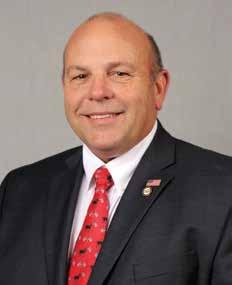
May was Mental Health Month. This time was a great reminder for each of us to make sure we are consistently checking in with ourselves, with our friends and family, and beyond our fencerows with our neighbors and community members.
Our mental wellness begins with selfawareness and taking the time to pause and check in with ourselves regularly. Farming is undeniably tough, and it comes with a lot of strict timetables and factors beyond our control. At the end of a long day, week or month, it can be easy to overlook our own mental health. But I hope you will each remember that a healthy farm is nothing without a healthy you. We need to make sure that we have self-care practices in place to manage stress and face whatever challenges come our way. This can be as simple as making time to exercise, taking a few minutes to reflect or journal or just spending extra time with loved ones. Even small changes can make a big difference. For me, that means starting each day reading my Bible and praying. I then carry that peace throughout my day, whatever it may
bring. It’s all about finding what works for you as you face the day.
We’re not meant to go it alone either. Please don’t hesitate to seek extra support when needed. I’ve often said when sharing my own experience of mental health, that stress can sometimes feel like a pressure cooker waiting to pop. The quicker we speak up and share what’s going on, the quicker we can begin to find the relief and understanding we need. Reflect on your stress levels and pay attention to any signs that your mental health may need a little extra focus.
You can also take advantage of many of our resources on our Farm State of Mind page such as the newest resource Togetherall, an anonymous online peerto-peer community moderated 24/7 by licensed mental health professionals. On Togetherall you can find so many tools to support you, such as self-help courses, self-assessments and free access to counseling and consultation services through Personal Assistance Services. There is even an agricultural-specific group to share or read others’ stories who are going through similar situations.
I’m really proud of our Farm Bureau members who’ve stood in the national spotlight to share their journeys in hopes that others will realize there is a pathway forward and plenty of support out there if you seek it.
It’s also important that we make sure we are checking up on our friends and family. By normalizing conversations about mental health within our social circles, we break down stigmas and help everyone feel comfortable sharing their experiences, both positive and challenging. Make it a habit to regularly call, text or visit your friends and family. We have so many great tools at our fingertips to stay connected, and those extra few minutes to send a message
or make that call can be the difference in someone’s day. Also, make sure to celebrate achievements and offer support during challenging seasons. A pat on the back or hand on the shoulder can go a long way. By offering a listening ear and providing words of encouragement, you’re showing up for them no matter what.
In rural communities, neighbors are like family, lending a helping hand whenever needed. Let’s extend that same spirit of support to our neighbors and community members. Take the initiative to reach out and strike up a conversation when you see someone around town or out working in the fields. You never know what someone’s day is like or the difference you can make. This is where the hospitality of farm country shines. Whether it’s providing help on the farm, bringing over a homemade meal or offering a friendly smile and greeting, farmers show up for their neighbors.
Let’s all take a few extra minutes to reach out and see what a difference we can make together. And if you’re struggling with where to start or want to know what resources are available, the Farm Bureau family is here to help. We have so many great resources on our Farm State of Mind page, and I encourage you all to check them out.
Everyone needs someone during challenging times and the more we create conversations around mental health and build accountability within our communities, the more we remind them that it’s OK not to be OK. Let’s take the time to check in with ourselves and check up on our friends, family, and our neighbors.
President of the American Farm Bureau Federation, Duvall raises beef cattle, hay and poultry in Greshamville, Georgia.

27 wfbf.com JUNE | JULY 2024
Embracing the Wild, Wild West of Carbon A Message from WFBF’s Rachel LaCount

It is a natural fit to focus on our environmental impact in the spring. In fact, the entire month of April is dedicated to the awareness of our Earth’s resources and how we can steward them.
For farmers, that stewardship carries throughout the year. The conservation practices farmers across the country have been implementing for decades are building a carbon portfolio and helping us reach our goals of carbon neutrality. Agricultural emissions have fallen to the lowest level in 10 years. A recent report by the Environmental Protection Agency shared that agriculture has slashed emissions by nearly 2% - the largest decrease of any economic sector.
As the calendar turns closer to the carbon-neutrality goal deadlines, Wisconsin Farm Bureau aims to empower farmers with the tools and resources to make informed decisions.
Carbon has been referred to as the “wild west.” It is a new territory, there are a lot of players and a constant stream of new information to decipher.
During Earth Week, Wisconsin Farm Bureau hosted a three-part webinar series titled “Carbon Perspectives Throughout the Supply Chain.” The webinars explored carbon considerations at the research level, farm gate and consumer brands.
The first webinar was hosted by Dr. Frank Mitloehner from U.C. Davis. Mitloehner is a professor and air quality specialist in cooperative extension in the Department of Animal Science at U.C. Davis. “Cow farts” are often blamed for climate change. While methane is a potent greenhouse gas, it is short-lived in the atmosphere. Methane is emitted from cow burps and manure, but it is also absorbed in the biogenic carbon cycle. It is a flow gas, meaning it is destroyed as quickly as it is produced so the levels of methane in the atmosphere are stagnant. Dr. Mitloehner shared the latest research and tools that are helping to further reduce methane’s impact on the environment.
Ben Huber from Insight FS hosted the second webinar. Huber offered valuable information for farmers to consider as they explore opportunities in carbon markets. He explained the difference between carbon offsets and carbon intensity and the different opportunities available in each space. No matter the route a farmer chooses to take, accurate data collection is key to success. Ben also encourages farmers to work with a
trusted advisor to guide them through the contracts and data collection process.
The webinar series concluded with Dan Christenson from PepsiCo. You can find at least one PepsiCo product in 94% of U.S. households. PepsiCo is home to many of your favorite chips such as Lays, Fritos, Cheetos and Doritos in addition to its robust soft drink category. PepsiCo has a large footprint in Wisconsin with two production facilities in the state and a large supply of potatoes sourced from the central sands. PepsiCo is seed-to-shelf, involved in every step of the supply chain. The company sources ingredients from all over the country and recognizes that a one-size-fits-all approach does not work when it comes to sustainability. PepsiCo’s sustainability initiative called Pep+ meets growers where they are at. Everything they do is in partnership with farmers and experts.
If you are interested in learning more about carbon, visit the Wisconsin Farm Bureau’s YouTube channel to watch the webinar recordings .
Wisconsin Farm Bureau is proud to empower and guide farmers and agriculturists toward a more sustainable future. We are embracing sustainable solutions to build a stronger tomorrow. We will continue to engage stakeholders and learn more about opportunities for farmers to help them reach their goals.
LaCount is WFBF’s Director of Sustainability Communications and Partnerships. In this role, she oversees the organization’s sustainability communication efforts.

28 WISCONSIN FARM BUREAU FEDERATION Rural Route
VOICES




29 wfbf.com JUNE | JULY 2024
Counties Receive Grant for Farm Neighbors Care Projects
Ten county Farm Bureau’s received grants courtesy of the Wisconsin Farm Bureau Foundation and McCade’s Joyride to fulfill projects related to the Farm Neighbors Care initiative. Farm Neighbors Care is a campaign to support our farmers who are facing stress due to low market prices, poor weather, crop conditions, etc. Farming can be an isolating career, especially if other family members work off the farm. It is important to check in on your friends, neighbors and family members to gauge how they are doing and offer support and a listening ear. The campaign asks rural residents to have face-to-face conversations with farmers and agri-business owners. For some, this conversation and check-in may be the dose of positivity needed to make it through a tough day.
Counties receiving $250 grants include: Adams, Buffalo, Eau Claire, Green Lake, Juneau, Racine, Rock, Sauk, Sheboygan and Waupaca.
McCade’s Joyride was started in 2018 to honor McCade Schubert who died by suicide in 2017. Through his family, a series of car shows and cruises are held throughout the year. Funds from those events have been donated to the Farm Neighbors Care campaign to assist with farmer wellness resources and programs.
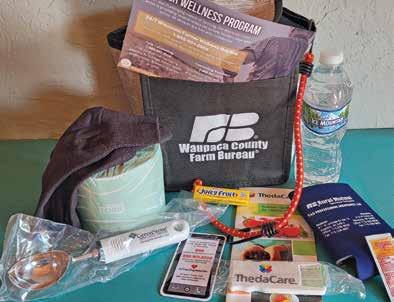
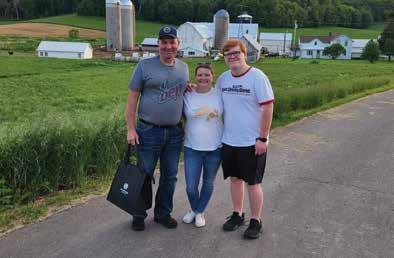
Waupaca County Farm Bureau teamed up with local FFA chaptersto assemble care packages for nearly 200 farmers within the county.
Members from Eau Claire County accepted nominations to recognize farmers within their communities. They delivered goodie bags to nearly 85 packages between Eau Claire, Jackson, Monroe and Trempealeau Counties.
Sauk County Farm Bureau put together a variety of baskets and gifts for families throughout the county who needed a lift and brought a bright spot to their day.

30 WISCONSIN FARM BUREAU FEDERATION Rural Route
Waupaca
Eau Claire Sauk
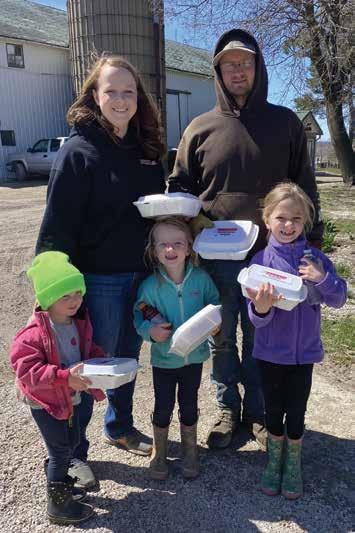
In April, Kenosha and Racine County YFA members made and delivered field meals for farmers.


Adams County Farm Bureau put together goodie bags for farmers and agriculture professionals to show gratitude for the work that they do and honor May Mental Health Month.
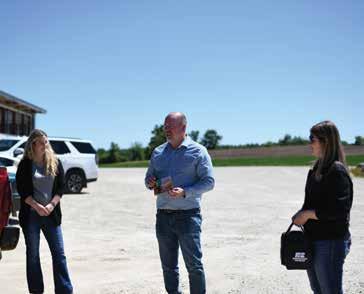
Wisconsin Department of Agriculture, Trade and Consumer Protection Secretary Randy Romanski helped deliver Farm Neighbors Care packages to members in Sheboygan County.
31 wfbf.com JUNE | JULY 2024
Heroes of Hope Named
Matt Beck and Scott Schreffler of Washington County have been recognized as top nominees in Wisconsin Farm Bureau’s fourth annual Heroes of Hope campaign.
Heroes of Hope, a subset of the #FarmNeighborsCare campaign, is focused on shedding light on rural heroes who have helped others through a tough time. Heroes of Hope aims to identify people who have helped bring hope to farmers or businesses, either in large or small ways. Members of the agriculture community were encouraged to nominate individuals who have made an impact on the way they conduct business, both ordinary and extraordinary.
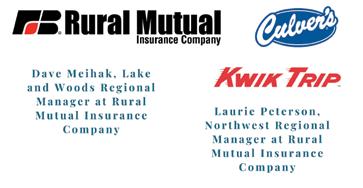
Also being recognized as finalists this year are Andrew Dal Santo of Grant County, Jennifer Webster of Pierce County, Tim Lins of Sauk County and Katie Roth of Grant County.
As this year’s Heroes of Hope, Beck and Schreffler will receive $500 cash, $100 to Kwik Trip and a Culver’s meal package valued at $50. The four remaining finalists will each receive $150 cash, $50 to Kwik Trip and a Culver’s meal package valued at $25.
The 2024 Heroes of Hope campaign was sponsored by Rural Mutual Insurance Company, Kwik Trip, Culver’s, Laurie Peterson, Northwest Regional Manager at Rural Mutual Insurance Company; and Dave Meihak, Lake and Woods Regional Manager at Rural Mutual Insurance Company.
Matt Beck and Scott Schreffler, Washington County
When a local farmer and parts counter employee lost his life to a farm accident, Matt Beck and Scott Schreffler knew that they needed to do something to honor their friend. Together, they organized a tractor gathering on the day of the funeral. More than 150 tractors of all colors and from five different counties gathered at Farmers Implement in Allenton to honor and celebrate their friend and beloved community member.
Matt wrote on his Facebook page, “I do not know where to start, the farming community is truly amazing. The love and support that was shown by this community for the Nehm family is unparalleled. When we came up with the idea for a tractor gathering we were anticipating 30-40 tractors and then everyone took it to a whole new level! 150 tractors from five different counties! Small town businesses and people donating food, drinks and their time to make this event possible I can’t thank you all enough! I hope everyone enjoys the video that was put together in Curtis Nehm’s honor, the video is wonderful. But it doesn’t do yesterday any justice, that was something you needed to be there to get the full effect. So once again I want to say thank you to everyone for yesterday. Curtis we miss you already.”
Matt and Scott went above and beyond to honor a friend of the agriculture community, and the community stood behind them.
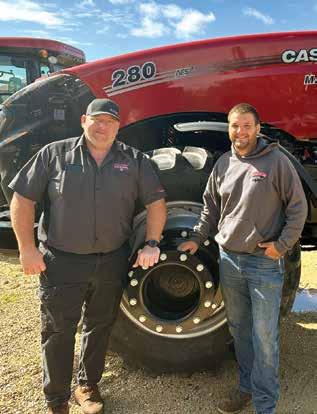
When Matt was asked what it meant to me named a Hero of Hope, he stated, “Seeing the farming community come together in a time of sadness is something that gives a young farmer hope for the future of farming.” Scott added, “I am very appreciative of the award but I wouldn’t consider myself to be a hero. We had a lot of support to make the gathering happen. I believe it was the right thing to do in honor of Curtis.”
32 WISCONSIN FARM BUREAU FEDERATION Rural Route
Heroes of Hope NEIGHBORS HELPING NEIGHBORS
Andrew Dal Santo, Grant County

Andrew's positive attitude and resilience, regardless of challenges, serve as a powerful example to others. His ability to stay positive and not let setbacks bring him down inspires those around him to adopt a similar outlook, fostering a community that is more optimistic and resilient.
His nominator said, “As a mentor for college students, Andrew plays a role in guiding the next generation of agricultural professionals. His mentorship provides students with valuable insights, support, and encouragement, helping them to develop their skills and confidence. Andrew is proof that one doesn't need thousands of acres to make an impact in agriculture. He encourages inclusivity and empowers small-scale farmers. This perspective promotes the idea that everyone, regardless of the size of their land, can contribute meaningfully to the agricultural industry. It inspires individuals to pursue their agricultural ambitions and innovate within their means.”
Tim Lins, Sauk County
Tim and his business are focused on providing assistance to farmers to get their jobs done. He is involved in the community, always looking for ways to help smaller businesses grow and prosper. His nominator said, “He is a great helping hand to local farmers. My husband and I personally would be lost without Tim, and many others also.”
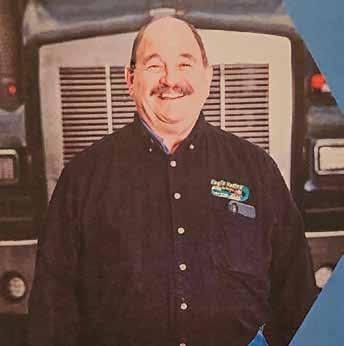
Jennifer Webster, Pierce County
After the death of her dad last summer by suicide, Jennifer, her mom and brothers have taken on the issue of addressing mental health within their rural community. Jennifer has helped to create the Farmer Angel Network in Western Wisconsin and has coordinated events and activities to educate community members about farmer mental health. The Farmer Angel Network of Western Wisconsin was recently awarded a grant from the Power of 100 in Ellsworth to continue these efforts throughout her community.
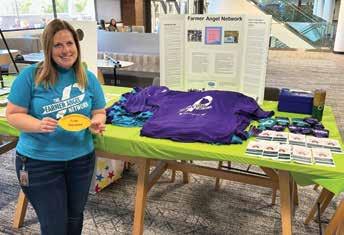
Katie Roth, Grant County
By consistently encouraging others to get involved in organizations like Farm Bureau and agriculture activities, Katie inspires and motivates people to participate, connect with others, and find fulfillment through these pursuits. Her emphasis on faith and family values instills a sense of hope, positivity and purpose in those around her. She encourages strong family bonds and a spiritual foundation, which can provide comfort and resilience during challenging times. By encouraging others to pursue educational opportunities, she helps foster an environment of curiosity, knowledge-seeking and self-improvement.
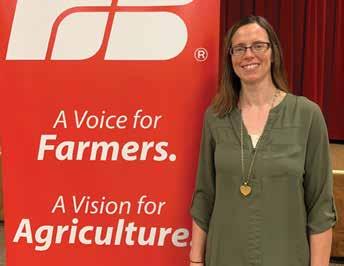
33 wfbf.com JUNE | JULY 2024
Collegiate Chapters Host Ag Day on Campus Events
The Collegiate Farm Bureau chapters at UW-Madison, UW-Platteville and UW-River Falls hosted Ag Day on Campus events for students, faculty and community members. The events focused on highlighting the importance of agriculture within Wisconsin. From hands on activities and animal visits to Wisconsin commodity handouts and guest speakers, more than 150 Collegiate Farm Bureau members helped to share agriculture’s story.
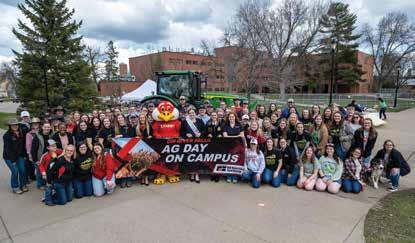
| April 11
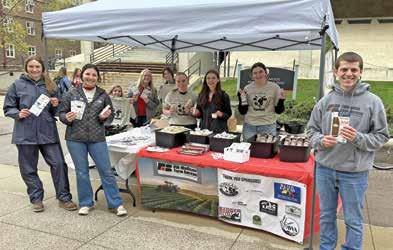
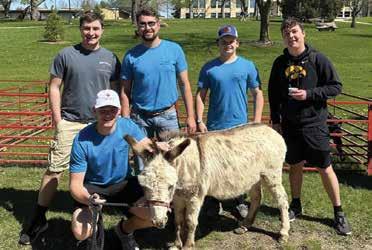

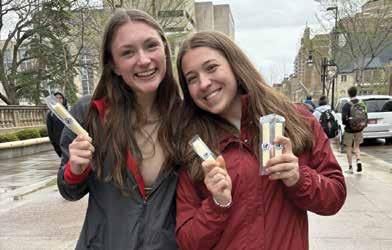

N C
UW-Madison
UW-Platteville
30 34 WISCONSIN FARM BUREAU FEDERATION Rural Route
A M P U S with Collegiate Farm Bureau UW-River Falls
| April 18
| April
Spotlight on
YFA
Get to know the members who are leading Wisconsin Farm Bureau’s Young Farmer and Agriculturist Program.
Jason Behrend, District 8 WFBF YFA Committee Representative Farm Bureau member since 2010
Why do you value your Farm Bureau membership?
Farm Bureau has so many aspects that help all farmers. Farm Bureau is a voice for farmers, helping our elected officials make educated decisions that can affect our everyday livelihoods.
What has been your favorite Farm Bureau experience and why?
By far my favorite Farm Bureau experience so far has been the Young Farmer and Agriculturist Fly-In to Washington, D.C. From meeting with elected officials and advocating for farmers to touring the beautiful city, I enjoyed meeting Farm Bureau members from other states and building new friendships with Farm Bureau members from Wisconsin.
What would you tell YFA members about getting involved in the YFA program?
There are so many opportunities through the YFA program. All you have to do is get involved. The YFA program gives you the opportunity to strengthen your leadership and public speaking skills, learn from other farmers and meet new friends.
Best words of advice/words of wisdom.
As the crazy farming season gets rolling – slow down a little,
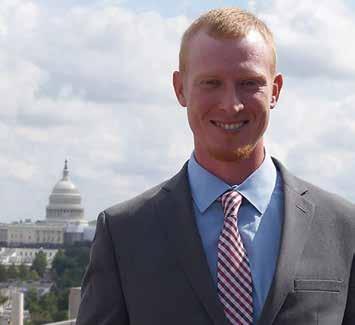
relax a little more and enjoy the occupation we love. Build a network of people around you. Have a safe summer!
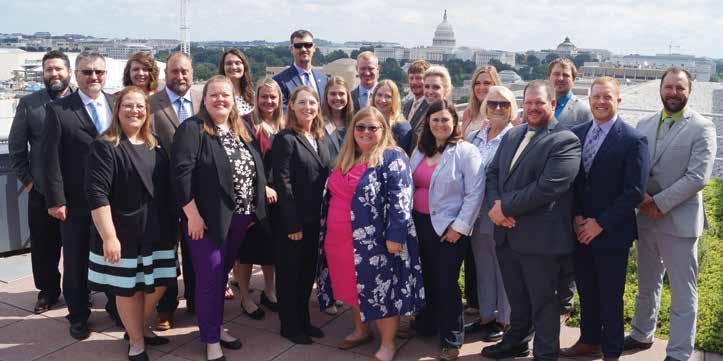
35 wfbf.com JUNE | JULY 2024
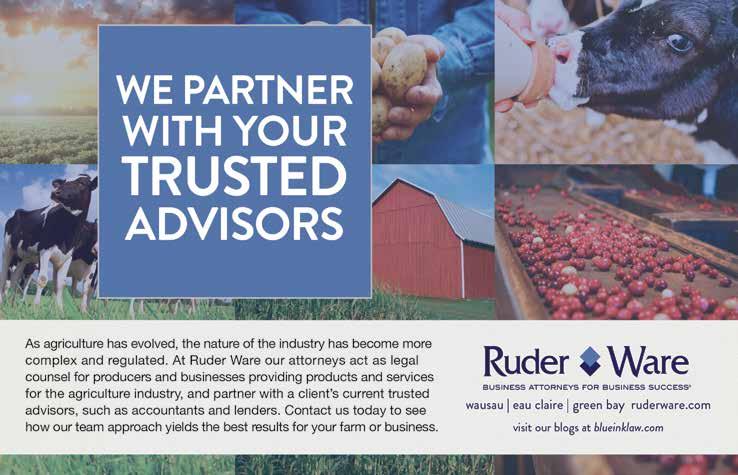


36 WISCONSIN FARM BUREAU FEDERATION Rural Route
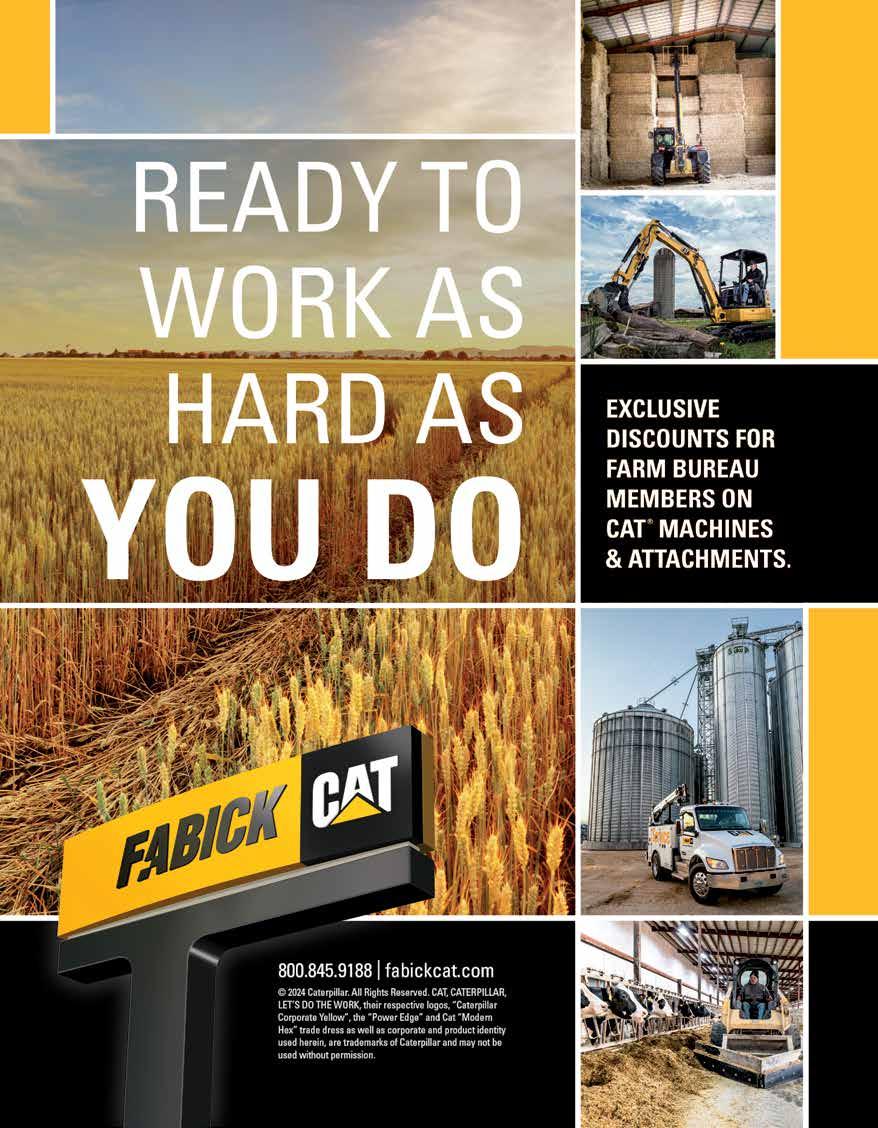
Reaping the Benefits of Agricultural Literacy Grants
Wisconsin Agriculture in the Classroom shares success stories from grant-funded agricultural literacy projects.
More t han 1,200 students, teachers and community members grew their knowledge and understanding of agriculture in their daily lives through the 2024-2025 Wisconsin Agriculture in the Classroom Ag in ALL Classrooms grant program. Seventeen grants totaling $9,500 were awarded to support agricultural literacy projects geared at connecting Pre-K – 12 th grade students with the food, fiber, fuel, forests and flowers that they use every single day.
Projects ranged from composting at River Trail Elementary in Milwaukee Public Schools to raising and releasing trout at
2023-2024 Project Highlights
“Enviroscape”
Kim Pokorny, School for Agriculture and Environmental Studies (SAGES), Waupun School District
Summary: Every student and teacher at SAGES participated in one of six interactive workshops facilitated using the Enviroscape – a model to demonstrate various types of pollution and the impact to watersheds. The pilot program was tested with students in grades K-6. In addition, a lot of additional "pollutants" and accessories added to the teaching model and manual. The Enviroscape model helped students to visualize the flow of water through our community.
Impact: 110 students
“During our test program, I learned that a parent of a student at SAGES used to be a trainer/educator for the Enviroscape in Georgia!
She had a lot of very helpful suggestions and provided a lot of guidance on how to make the presentation even more impactful and interactive. This education tool will be used for community outreach and throughout the district going forward.”
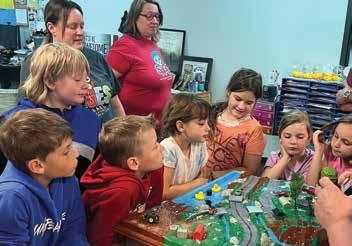
Merrimac Community School near the Wisconsin River. The projects afforded students and educators the equipment, materials and support to learn science, social studies, mathematics and more through the enriching context of agriculture.
Through the generous support of the Wisconsin Farm Bureau Foundation, the Ag in ALL Classroom grant program is now open for proposals for the 2024-2025 school year. Formal and informal educators are encouraged to apply at wisagclassroom.org. Project proposals are due June 30.
“Artisan Cheese”
Sheila Kroseberg, Waupaca High School
Summary: Cheese making principles and techniques were implemented into an introductory culinary class. The course began by introducing the history and significance of cheese in various culinary traditions. Next, students explored the cheese making process with hands-on labs that included making mozzarella cheese and preparing a dish, "Three Cheese Gnocchi Bake," that featured four different cheeses. Additionally, to reinforce learning, students engaged in tasting sessions and learned to pair different cheeses with accompaniments. Throughout the unit, emphasis was placed on food safety, sanitation and sustainable practices, while highlighting potential career paths in the cheese industry.
Impact: 80 students
“This unit was so much fun and remarkably delicious!”
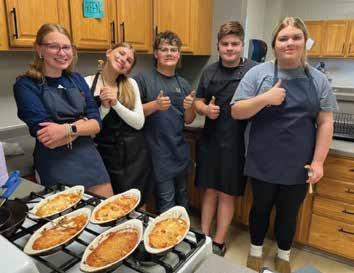
38 WISCONSIN FARM BUREAU FEDERATION Rural Route
AG IN THE CLASSROOM
Students at SAGES explored watersheds and worked with the Enviroscape model system to see the impacts of different forms and sources of pollutants in watersheds.
Waupaca High School students learned about the history and art of cheese making. Students explored and tasted different varieties and styles of cheeses as well as made cheese.
“Hatching Chicks”
Brooke Behling, Stetsonville Elementary School, Medford School District
Summary: With the grant money, the kindergarten classes successfully hatched 37 chicks and 22 ducks. We used the grant money to purchase a top-of-theline Brinsea 56 EX fully automatic incubator. The incubator is typically around $700, but an amazing sale offered it for $479. We used the remainder of the grant money to purchase chick food for the classroom. The new incubator replaced our old incubator which made viewing hatching difficult and was starting to have very inconsistent hatches due to being old and worn out. With our new incubator we had a 95% hatch rate and the teacher workload to control humidity, egg turning and monitoring temperatures was minimal.
Impact: 125 students
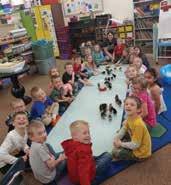
Stetsonville Elementary Kindergarten students enjoyed a successful hatch of chicks as they learned about life cycles and animal care.
“We were so excited to have received the grant this year. We are thankful to Agriculture in the Classroom and Wisconsin Farm Bureau for supporting this program!”
“Trout in the Classroom”
Jenna McCann, Merrimac Community School, Sauk Prairie School District
Summary: Students raised and released 48 rainbow trout from January to May 2024. Students were in charge of daily feeding and water quality monitoring. They also learned about the life cycle, natural habitat and conservation efforts. Grant money was used to fund equipment necessary for raising trout in a recirculated system and the bus costs for the release field trip.
Impact: 130 students
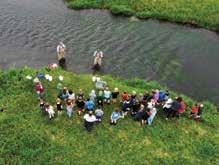
“This was our most successful year ever! Thank you for your support!”
“Drones in Agriculture”
Nick Gagnon, Chippewa Falls High School
Summary: The grant money was used to purchase software (Pix4D Fields) to analyze field data from multispectral drone mapping. During the summer of 2023 students and staff mapped several local fields and forests. Then, using the Pix4D and its artificial intelligence, students looked at the fields to understand and analyze the data. Identifying areas of drought, low nitrogen levels and weeds were only a small part of the software's capabilities. This was done with all the remote pilot classes in the fall of 2023 and spring of 2024.
Impact: 100 students
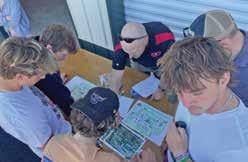

39 wfbf.com JUNE | JULY 2024
Merrimac Community School students gathered with conservation experts to learn about water quality, water sheds and release their trout into the river.
Chippewa Falls High School students engaged with the latest software to learn about precision agriculture while implementing best practices for land and water management.


DAY
Wednesday, Aug. 14
Join us this summer for our third annual Giving Day, taking place on Wisconsin Farm Bureau Federation’s website, Facebook and Instagram pages.
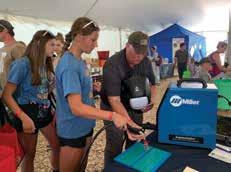
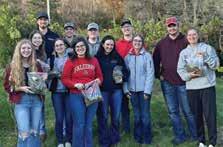
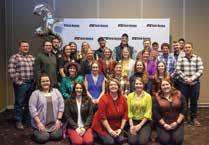
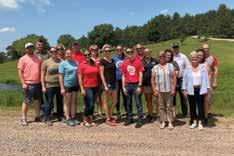
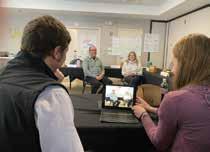

All proceeds from Giving Day provide critical funding for education and leadership programs supported by the Wisconsin Farm Bureau Foundation, including:
• Agriculture in the Classroom
• Young Farmer and Agriculturist Program and Conference
• Promotion and Education Program
• Leadership Institute
• Collegiate Farm Bureaus
• Sustainability and Education Programming
• Farm Neighbors Care
Thanks to generous donors and sponsors like you, previous Giving Days have raised more than $75,000 in total, supporting these important Farm Bureau programs.
Event Highlights
• Individual donors who give $100 or more will receive a limited edition “Friend of the Farmer” t-shirt.
• All Giving Day donors will be entered into a prize drawing for one of several $200+ prizes

You don’t need to wait until Aug. 14 to be part of Giving Day! Visit wfbf.com/foundation or scan the QR code to give today.
Thank you for your continued support of Wisconsin Farm Bureau Foundation!
42 WISCONSIN FARM BUREAU FEDERATION Rural Route
Wisconsin
Farm Bureau Foundation GIVING
Foundation
Wisconsin Farm Bureau®
Agriculture in the Classroom
Collegiate Farm Bureau
Leadership Institute Young Farmer and Agriculturist
Promotion and Education

Five Home Improvements to Increase Value

Whether you’re getting ready to sell your home or just need to make updates, there are improvements you can make to increase your home value without breaking your budget. Owning a home can be an ongoing to-do list but there are projects for all skill levels and price ranges to make it manageable.
Updates to Increase Your Home Value
1. Paint – Paint is a simple, cost-effective home improvement. Thirty-six percent of sellers paint their home’s interior before selling. If you’re selling and have any colorful rooms, paint the walls a neutral color. This helps the potential buyer envision the room as a blank canvas. This update also applies to any outdoor areas such as a deck, siding and front door. If the paint or stain is faded and chipped, take the time to apply a fresh coat.
2. Flooring – If your home has carpet, when was the last time it was replaced? Carpet generally has a lifespan of five to 15 years depending on the type of carpet and wear and tear. Some indicators that it is time to replace the carpet include tears, fading, wrinkles, stains and smells. If you have children or pets, new buyers may especially appreciate fresh carpet. Also, consider hard surface floors in high traffic areas such as hallways, stairs, kitchen, entryways, laundry and mud rooms.
3. Landscaping – Curb appeal is a huge selling point to buyers and the neighborhood to make a good first
impression. Consult a landscaping or garden center expert if you’re not comfortable tackling it yourself or unsure what grows best with your soil type, amount of sunlight and layout.
• Add a layer of fresh mulch to your landscaping
• Cut back and trim overgrown bushes and hedges
• Plant shrubs and colorful plants
• Consider plants that are drought-tolerant and low maintenance to have curb appeal all year long
• Fix patches or overgrowth in the lawn
4. Small updates = a big return – If you can’t afford full-room remodels, make small updates in each room to freshen up the house.
• Remove dated wallpaper
• Update light fixtures
• Add a ceiling fan in bedrooms
• Replace a bathroom vanity
• Update cabinet hardware
• Repair any faulty mechanics or plumbing which could lead to bigger issues long-term.
• Add smart home technology
5. Prioritize bigger updates – If you’re going to pick a room to make bigger updates, the kitchen and bathroom are the two rooms in a house that have the biggest ROI.
Consider incorporating energy saving tips along the way to save on home energy bills. Connect with a local Rural Mutual agent as you make updates to make sure you have enough coverage as the potential of your home value increases.
Protect Your Digital Devices While Away from Home
When you’re preparing to leave your house for time away, you probably have a long to-do list, no matter how long you’ll be away. One of the most important tasks should include protecting yourself and your digital devices to avoid the chance of identity theft or hacking.
Before You Leave
If you’re going on a long weekend or extended trip, wait to post your adventures on social media until you get home. You don’t want the wrong person to take advantage of your absence. Update all devices before you leave and make sure firewalls are secured to prevent hackers from gaining access. Secure all important documents, including passwords to accounts and Wi-Fi passcodes.
Set up lock screens, timeout functions, device tracking and multi-factor authentication for your devices for extra security. If they get lost or stolen, these precautions will make it harder for hackers to get access.
Don’t Stay Connected
Turn off the Bluetooth and Wi-Fi connections when you’re not using them, so they don’t automatically join public, unsecured networks.
If you’re using a public Wi-Fi network, review the network name to ensure it’s safe to join. When you’re done scrolling, go into your Wi-Fi settings and click ‘Forget Network’ as an extra measure of security.
While You’re Gone
To be safe, avoid checking important accounts such as banking while you’re away.
Wipe down your devices more than usual. Not only will it help keep your devices clean and germ free, wiping away fingerprints can erase any indication on your passwords, making it harder for hackers to get access to your device.
Reach out to your local Rural Mutual agent or visit our cybersecurity learning center on our website for additional tips for being safe online.
43 wfbf.com JUNE | JULY 2024 RURAL MUTUAL
Four Tips for Buying a Rental Property

Buying real estate can be a smart investment to diversify your income. Just like any business endeavor, it’s important to do your research and have a plan going into the process.
Location
You can change cosmetic features about a house, but you can’t as easily change the location. A home in a desirable neighborhood will naturally attract your target audience.
Think about:
• Distance and quality of nearby schools
• Distance to convenience stores and grocery stores
• Crime rate
• Current or upcoming economic development plans that could property values
Landlord Responsibilities
Take time to understand landlord laws, familiarize yourself with state statutes, tenant rights, eviction considerations, security deposits, and lease agreements. Make sure you’re comfortable handling tenant issues. Joining your local apartment association is a good resource for education and to build your network of fellow landlords.
As the property owner, it will be your responsibility to maintain the property. If your property maintenance skills are limited, plan on additional expenses for outsourcing to contractors.
Calculate Your ROI
Consider how much you will pay for the property and what
expenses you will incur versus how much income you will bring in and at what point you will begin to make a profit.
The expenses of a rental property may vary depending on the type and size but a few constants you can anticipate include:
• Mortgage
• Insurance
• Property tax
• Repairs and maintenance
Think about how much you will need to charge for rent to be competitive in the market but still cover expenses. Do a market analysis of the other rental properties in the area and amenities they offer, then set your price from the data. At minimum, the rent should cover the mortgage but be careful as that doesn’t allow for any additional income to be reserved for emergencies.
Net profit ÷ cost of investment x 100 = ROI
Get Insurance
Always be prepared for the unexpected, that’s what insurance is for. Especially when someone else is living in a home that you own. Research shows that rental properties are more accident-prone than owner-occupied properties. As a landlord, it’s important your rental property is properly insured to cover physical property to the building, liability, and loss of rent coverage.
Insurance for rental properties doesn’t cover tenants’ personal belongings so it’s important your tenants have renters insurance. Why is renters' insurance important?
• Protects personal belongings from threats such as fire, vandalism or theft
• Protects yourself from lawsuits filed against you
• Provides living expenses after a covered loss
Contact a local Rural Mutual agent to get a quote for rental property insurance.
Protect Your Business with Equipment Breakdown
Everyday businesses from large manufacturing operations to small retail stores rely on their mechanical and electrical equipment to maintain their operations. No business can afford losses that may originate from mechanical, electrical or pressure systems equipment.
Although more common than a fire, these equipment failures are not covered by many standard business owner and commercial property policies, resulting in costly coverage gaps.
Equipment Breakdown coverage addresses these gaps.
What is Equipment Breakdown coverage?
Equipment Breakdown responds to the cost of repairing or replacing mechanical, electrical or pressure systems equipment that suffers a breakdown.
Adding this coverage enhancement to your commercial insurance policy provides extra protection from
exposures such as:
• Telephone systems
• Electrical systems
• Production equipment
• Boilers
• Fired water heaters
• Refrigeration units
• Air conditioning systems
• Compressors and pumps
• Engines
• Motors
• Generators
• Transformers
• Switchboards
• Distribution systems
Indirect losses arising from a covered equipment breakdown can result in additional losses, such as business interruption, extra expense and spoilage. Warranties and maintenance contracts may have gaps as well. Typically, they do not cover accidents with equipment caused by operator error, business interruption, extra expenses or spoilage losses that can result from an equipment failure.
44 WISCONSIN FARM BUREAU FEDERATION Rural Route RURAL MUTUAL
Succession Planning for Business Owners
Whether you own a glass company in Green Bay, a car dealership in Platteville or bait shop in Rhinelander, now is the time to tackle succession planning if you’re thinking about retiring.
What is succession planning? It's the process of preparing for the transition of leadership and ownership when you decide to step away.
The Importance of Succession Planning
As a small business owner, you've spent years, possibly decades, building your business. It’s not uncommon for a small business owner to overlook the importance of succession planning, but it's a crucial step in making sure your business succeeds after you’ve moved on. Research shows only 70% of small business owners take this major step.
Simply put, succession planning involves deciding who will take over when you retire. It’s also about preparing your successor for leadership. Committing to this process sets your business up for success even after you've stepped aside, reducing disruption during the leadership transition and securing the legacy of what you’ve worked so hard to build.
Planning for unexpected events or emergencies is another piece of the puzzle. Life is unpredictable, and unforeseen circumstances can strike at any time. Like succession planning for retirement, preparing for the unknown includes:
• Finding potential successors
• Outlining roles and responsibilities
• Drafting a clear roadmap for a smooth continuation of operations
When to Start Succession Planning
As the saying goes, “Don’t put off tomorrow what you can do today.”
Especially for business owners nearing retirement, it's best to start succession planning well in advance. At minimum, you should start before you decide to sell your business. More specifically, a good rule of thumb is to start planning three to five years before you want to sell.
This will give you plenty of time to make thoughtful and calculated decisions in preparation for a sale. This also gives you more time to prepare and train potential successors.
Key Components of Your Succession Plan
There are six key components you should have in your succession plan:
1. Create a timeline for handing off the business: Many owners base their timeline on when they want to retire. However, the best time to sell is when your business is thriving and running smoothly, when it’s most appealing to buyers.
2. Find out the value of your business: Working with a business broker can help with this process.
3. Gather financial statements: Getting your financial house

in order is essential to succession planning. This is also a good time to have an accountant conduct a business audit.
4. Lay out processes and operations: Even if you’re selling within the family, don’t assume they’re familiar with exactly how your business functions.
5. Select a successor: This is the most important decision of succession planning, whether your candidate is a family member, business partner or third party.
6. Reveal the plan: Transparency is important for all stakeholders. Carefully consider how you’ll deliver the news, as this is likely to be an emotional announcement.
Legal and Financial Aspects of Succession Planning
Don’t be caught off guard by potential legal hurdles. Your best bet is to consult with an attorney specializing in succession planning for guidance on:
• Ownership transfer
• Shareholder agreements
• Contracts
• Compliance with relevant laws and regulations
Likewise, you’ll also want to understand potential tax implications that may affect the financial outcome of the transition. Contact a tax advisor to learn more about:
• Capital gains extensions: You may be eligible for a lifetime capital gains extension, which could reduce your tax burden on the sale of your business.
• Estate and gift tax planning: These taxes can significantly impact the transfer of ownership to family members. Smart planning will help minimize tax liabilities, leading to a more seamless transfer of ownership.
Succession planning may seem daunting, but it’s a must-do to ensure your business thrives after you’ve handed over the keys. Whether you’re considering succession planning or not, your small business needs smart protection. Learn more about coverage for your Wisconsin business by reaching out to your local Rural Mutual Insurance agent.
45 wfbf.com JUNE | JULY 2024
Can Someone Else Drive My Car?
Have you ever let a friend borrow your car? Chances are the answer is yes.
The situation probably made you feel a bit uneasy. What if my friend gets in an accident? What if my friend injures the other driver? What if passengers are involved, too?
Does Car Insurance Follow the Car or Driver?
In most cases, car insurance follows the car. Your personal auto policy covers what is called “Permissive Use.” This means your coverage extends to anyone using your vehicle if they have permission:
• Liability covers injuries to people and damage to property when you or a permitted driver are at fault in an accident
• Collision and Comprehensive covers damage to your car in an accident and any other cause, like vandalism, theft or falling objects. These two coverages pay out regardless of who is driving or responsible.
• Medical Payments pays for medical expenses for you or a permitted driver after an accident, in addition to passengers. Rural Mutual auto policies cover medical expenses up to three years after a crash.
What if losses exceed my coverage limits?

As long as the permitted person using your car isn’t an uninsured driver, their policy would cover any costs beyond your policy’s limits.
This works both ways. If you borrowed your friend’s car and crashed it, you'd be covered by the owner's policy first, with your policy serving as secondary.
What is Uninsured and Underinsured Motorist Coverage?
You might see uninsured and underinsured motorist coverage on your car insurance policy but you might not understand the difference or what your limits should be.
Rural Mutual only does business in America’s Dairyland, so we’ll focus on how uninsured and underinsured coverage works in Wisconsin only.
What is Uninsured Motorist Coverage?
Uninsured motorist (UM) coverage applies to when you, your family, and other passengers of your vehicle get hurt when hit by an uninsured motorist (someone without car insurance) or hitand-run driver. It also provides coverage if you or your family are injured by an uninsured motorist or hit-and-run driver while walking down the street as a pedestrian.
Even though auto insurance is required in Wisconsin, 13.3% of its drivers go without it. This means if you get in an accident, there’s a one out of eight chance the other driver will be uninsured.
Uninsured motorist coverage makes sure money is available to pay for your losses that were caused by someone else.
Common examples of bodily injury losses include:
• Broken bones
• Nerve damage
• Pain
• Brain damage
• Internal injuries
Wisconsin law requires uninsured motorist coverage with a minimum limit of $25,000 for one person and $50,000 per accident for bodily injury.
What is Underinsured Motorist Coverage?
Underinsured motorist coverage protects you when the driver
doesn’t have enough insurance.
The maximum amount payable is the difference between the at-fault driver’s limits and your UIM coverage limits. In other words, money from your carrier and their carrier will be used to recover losses up to the limits you have selected.
Underinsured motorist coverage is mandatory in some states but not required in Wisconsin. If you purchase underinsured coverage, minimum coverage limits of $50,000 per person and $100,000 per accident are required.
Why isn’t Property Damage Covered?
It exists, but not every state offers uninsured motorist property damage (UMPD) coverage, including Wisconsin. Here, it’s pretty simple. If an insured vehicle is damaged by an uninsured driver, or a hit and run driver, carriers use collision coverage to cover the damage once the insured pays their collision deductible.
A carrier’s claims department would then typically attempt to recover the insured’s deductible from the uninsured driver, although this is not always successful. Filing a police report can increase the chances of recovering the deductible.
Five Key Takeaways
1. Uninsured means no insurance, underinsured means not enough insurance.
2. One out of eight drivers in Wisconsin are uninsured.
3. Uninsured motorist coverage is required in Wisconsin.
4. Underinsured motorist coverage is not required in Wisconsin.
5. In Wisconsin, both coverages cover bodily injury only, not property damage.
46 WISCONSIN FARM BUREAU FEDERATION Rural Route RURAL MUTUAL

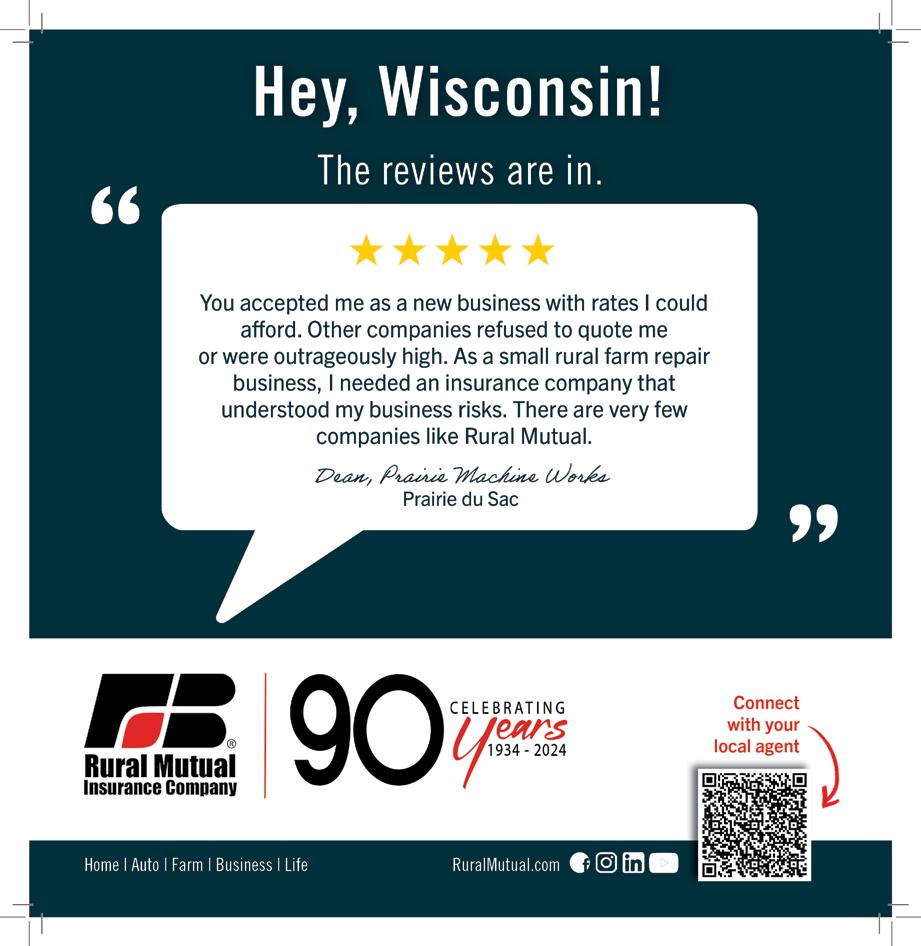








































 With Kari Schoenike
With Kari Schoenike



















































































